#literal relationship status as LOVERS between two male characters
Text
Every scrap of leak information about potential p1 and p2 remasters make me so hopeful pls atlus I need them
#it just makes me so mad when people who know nothing about the earlier games dismiss them for being too combat focused or not calendar style#like just because they arent the same style doesnt mean they arent phenomenal games#p3 is one of my all time favorite gsmes and before i even played 2 just watching it on youtube it is now tied with p3#and playing through it on an emulator was so much FUN#i LOVED the combat#the fusion attacks and the different levels of affinity for different arcanas#its so interesting#plus nameless and belladona my BELOVEDS#and i mean come on#literal relationship status as LOVERS between two male characters#the two MAIN MALE CHARACTERS#plus how much of p5 was inspired by p2 COME ON#THE MAIN LEITMOTIF OF THE MUSIC NO LESS#NOT TO MENTION ALL THE PLOT OF ENDGAME 5#god i will legitimately cry if they get a remaster#im not even done playing through reload but now i want to reemulate the twos#shoutout to the modders getting us a better ep jfc#AND PLEASE ATLUS RELEASE THE TWOS TOGETHER WE NEED A CONSISTENT PLATFORM AND TRANSLATION
1 note
·
View note
Note
I was wondering if there are instances where the seme/uke roles change once the couple becomes a couple. Like can one person be the pursuer before the relationship starts but then the other will have the power/control over the relationship once they are together? Or does that not happen and once a seme, always a seme?
Instances of seme/uke role reversal
Are there instances where the seme uke roles change once the couple becomes a couple?
There are some instances of male characters in Kdramas and romances form Mainland China saying outright, "After I marry, my wife has complete control." Like literally “she'll be in charge of everything and tell me what to do.” This is a kind of outsourcing the moral compass. It can include him literally passing over the wallet (or house keys), giving her the financial reigns. There’s a little bit of this in Love O2O.
I mention this because of the heterosexual dysmorphia of seme/uke originally, so this kind of flip is not unheard of.
You need a specific kind of personality in the seme. He needs to be very invested in the long term nature of the relationship, and very much willing to trade power for love/sex/affection. These aren’t really core seme personality traits.
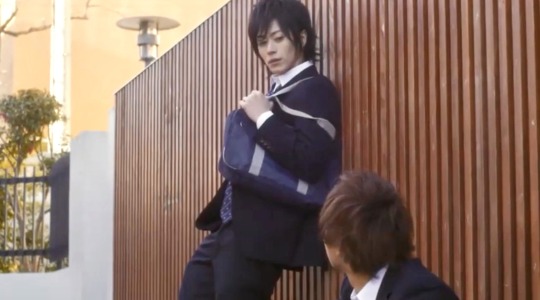
Seryo in Seven Days (see? there it is, I found a way to mention it) says he likes to be ordered about by his lover. But their's isn't really a seme/uke dynamic.
Back to your question.
2022 UPDATE
Love triangle interest and ex-bf (seme) of the main uke in Check Out the series, becomes the center of his own love triangle in the final 3 episodes, where he is being courted by a boy who clearly wants to be his seme and pined after by a younger boy who wants to be his uke. This is the only obvious instance I have ever seen. Tee literally implies that’s one of the things he is struggling to decide between:
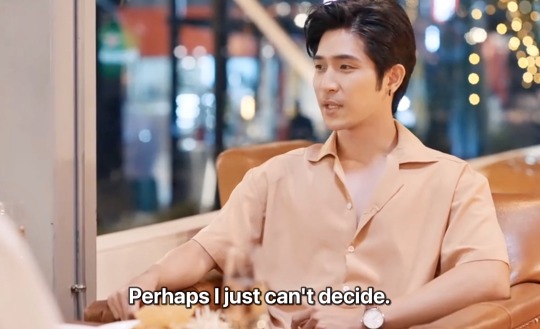


Be Love In House: I Do springs to mind. Also the Cornered Mouse Dreams of Cheese. But both of these I question whether seme/uke exists. And if it does, the uke has a TON of agency.

There are definitely side dish instances like PitchBank in Golden Blood or CopyNampu in Top Secret Together or even KhunKao in Brothers, where the uke character is clearly the boss of the relationship once they get together and this may (or may not) have been the reason for the difficulty in getting together in the first place:
the seme realized his boy was bossy from the start and knew any resulting relationship meant handing over the reigns in the end.
Then again there are semes that really seem to relish the idea.
We don’t often get to follow the couple into their coupledom, so it’s hard to say for certain what happened.
I think the best example might be WBL.

I mean ShiDe in We Best Love 2 says he’s willing just to be ShuYi’s assistant in order to never leave his side, and we can all tell he’d be happy to be a house husband. He also offers ShuYi’s dad a dowery (for himself).
All this is an identity pay out. Since social position (especially job & title) is vital to masculine status, ShiDe willing to sacrifice that could be seen as a handing over of the seme role going forward. Also we all know who rules the roost and the relationship with these two - ShiDe might have pursued but ShuYi is in charge.

At the end of Addicted doesn’t GuHai basically say “I will let you get away with anything so long as you don’t betray (cheat on) me?” So that might count. But we never got to see this proved in any way.
I’m sure there are a few other examples of this kind of power dynamic shifting.

(source)
#Thai bl#taiwanese bl#Japanese bl#Love O2O#chinese bl#addicted web series#We Best Love: No.1 For You#We Best Love: Fighting Mr.2nd#we best love#Golden Blood#Top Secret Together#brothers#seme uke#seme/uke#BL archetype#archetypes#bl tropes#romance tropes#Be Love In House: I Do#seven days#Cornered Mouse Dreams of Cheese
81 notes
·
View notes
Text
26 Reasons why Qrow is not Ruby’s father and why Taiyang is Ruby’s father
In response to the toxic aspect of the fandom attacking CRWBY and demanding that their desires for Qrow be chosen over canon, or how they feel their theory is more valid than the show itself?
I have researched RWBY to make this 26-point Discussion as to why Canon is valid, and fancanon is not when it comes to Qrow Branwen, Ruby Rose, Taiyang Xiao Long, and Summer Rose.
1. “Monty said NO”
Most obviously. Monty Oum.
He said in this tweet that ruby and yang are half-sisters…half-sisters, which means they share the same mom or dad…in this case Taiyang….
https://twitter.com/montyoum/status/492070189731565568
Now people have claimed “he obviously meant step-sisters or cousins”
Why is it that every time we show the English dictionary to you people or ask you to read it, that you claim you are being attacked or that you claim Monty was misleading us?
2. The writers said NO
Miles Luna debunked this theory on Reddit…
He pointed out that Ruby sees Qrow as a Role model, so she adapts her colors to be similar to his.
And you don’t need somebody to be blood to be your role model.
https://www.reddit.com/r/RWBY/comments/7x3w4s/crwby_ama_w_miles_luna_kerry_shawcross_and_paula/du5d67g/?
3. “Rooster Teeth said NO”
Rooster Teeth even said that Qrow is "Ruby and Yang's Uncle"
They also said “Ladies, he’s not your man”
https://twitter.com/RoosterTeeth/status/1067205612331782144
4. “But what if Summer had feelings for Qrow? Why does Qrow Serve Ozpin?”
Qrow said in Volume 6 " No one wanted me... I was cursed... I gave my life to you because you gave me a place in this world... I thought I was finally doing some good... "
So he was saying he wasn't wanted, so no relationship with Summer.
SUMMER DID NOT WANT HIM.
And he was literally saying he served Ozpin because Ozpin gave him purpose.
It’s pretty sad how people think Qrow can only be a complex character if he obsesses over another person’s wife and child.
What , you wanna make him Severus Snape, the Lilly Potter stalker who insulted a girl’s face and tried to poison a boy’s pet and publicly outed a teacher?
https://rwby.fandom.com/wiki/Qrow_Branwen/Quotes#So_That.27s_How_It_Is
5, "But Qrow could be lying"
Except in volume 6 Qrow literally said "Don't lie...we're better than that"
And in volume 7?
" Long time ago. I just found working alone tends to be for the best "
" Gotta say, I’m still not really used to working with other Huntsmen in the field. "
And finally World Of Remnant on Patch.
" Nice place to raise a family, if you're into that sort of thing. "
https://rwby.fandom.com/wiki/Qrow_Branwen/Quotes#So_That.27s_How_It_Is
6. “Qrow fans claim that Ruby and Summer form a core part of Qrow’s character and backstory.”
WRONG!
The main accusation for demanding Rooster Teeth / CRWBY change the backstory for Qrow would accomplish nothing.
Raven already pushed Yang onto Taiyang to raise on his own.
Qrow forcing Tai to Raise Ruby alongside Yang while Qrow could regularly visit, and while Summer lived with Taiyang, Yang, and Ruby?
It would cheapen Qrow’s character….blood isn’t everything. Neither are cliches.
7. “But what if Qrow gave Ruby to Tai to raise after Summer’s death?”
Volume Chapter 6, Burning the Candle.
Yang tells Blake that she (yang) and Ruby were raised together by Summer and Taiyang…not by Taiyang on his own, but by Summer and Taiyang.
Yang clearly had memories of being raised by Summer and Tai both, which meant that Summer and Taiyang lived together raising Ruby and Yang for Several Years.
https://www.youtube.com/watch?v=yZkN-53h5Os
8. “Does Taiyang care about Summer or Ruby?”
Taiyang was noted to have shut down when Summer didn’t come back….
Yang noted this in Volume 2 Chapter 6, and Ruby mentioned in the first episode of Volume 3 that Taiyang missed Summer.
Qrow also said that Ruby is Taiyang’s “Special Angel”….
Ruby has also pointed out numerous times that Taiyang is Overprotective of Ruby.
In fact, Ruby's conversation with Penny about overprotective fathers.
9. “Qrow knows Taiyang is Ruby’s Father. Taiyang knows Ruby is Taiyang’s daughter.
Qrow has referred to Taiyang as Ruby’s father during volume 3 and 7.
Taiyang referred to Ruby as his daughter in volume 3.
10. “Why didn’t Taiyang train Ruby in Martial Arts?”
Taiyang is a martial arts fighter.
Ruby has neither the build nor the personality for ruthless hand to hand combat like her sister…
Taiyang would trust Qrow, despite his semblance.
Remember how bad Ruby was in v5?
11. “Qrow’s semblance is not what his fans exaggerate it to be”
Speaking of Qrow’s semblance? He was playing video games with his nieces,
taught at Signal Academy,
and could train Ruby…
Clearly, his semblance is not what theorists make it out to be.
12. “Why doesn’t Qrow treat Yang the same way he treats Ruby?”
Yang is the daughter of Qrow’s sister,who abandoned the team.
During a one on one interaction between Qrow and Yang after yang vs mercury, Qrow called his own niece crazy, after she had been framed.
Qrow was not empathetic to Yang.
Qrow may not like Yang’s resemblance to Raven.
Ruby is the daughter of his two closest friends, so of course he’d prefer Ruby over Yang.
13. “Examples of Taiyang caring for Ruby.”
Volume 2 Ruby was excited when Taiyang sent a package in the mail, not even knowing it was Zwei.
Taiyang was at Ruby’s bedside in V3, and gave her a kiss on the forehead.
He also tried to bring her breakfast in bed.
Taiyang said he wanted to chase after Ruby, but had to nurse Yang back to health.
During the V8 broadcast, Taiyang was upset when the broadcast was cut.
14. “Genetics research”
Black hair is the subtype of the pigment for blonde hair…
Also, Ruby’s got the same hair strand that Yang and Taiyang have.
Finally, black hair is more dominant.
So Ruby doesn’t need blonde hair to be Taiyang’s kid.
https://askinglot.com/is-black-hair-a-dominant-or-recessive-gene
https://www.quora.com/If-a-jet-black-haired-parent-and-a-blonde-parent-have-children-what-color-hair-would-the-children-likely-have
15. “The STRQ Photo”
The photo....Qrow was with STRQ for four years...do you really think Qrow is not allowed to cry on the photo unless he was romantically involved?
Can't a man grieve over the death of a female friend that he was NOT in a relationship with?
Or are men not allowed to have female friends?
Ichigo and Rukia from Bleach for example...friendship.
They were his friends, his family. People seem obsessed with the idea that Qrow cannot care about a woman unless he was romantically involved or unless he's their bastard father.
16. “Men and Women…as friends, platonic”
Harry Potter as a book showed that a boy and a girl can interact and still be friends…
Why can’t Qrow be Summer’s friend?
Why does he have to be her lover?
We’ve seen Qrow talk about Innkeeper’s skirt lengths and leer at Barmaids who flirted with him.
Also, he’s shown to be bonding with both Clover and Robyn.
People act like he doesn't flirt with anyone , and yet he does.
17. “Bad Luck Charm”
Qrow has spent his whole life with his semblance, named after a Crow.
Raised by the Branwen bandit tribe.
“You and I are not the same, you don’t want the burden of my name”
Both Branwen and Qrow are names that Qrow hates due to his semblance and past…
People may think of him as cool, but Qrow suffers from self-loathing.
So NO, the Bad Luck Charm song does NOT in fact allude to Qrow being Ruby’s father, but that Qrow hates himself, hence a major part of why he’s alcoholic.
Proof of which is his volume 6 exchange with Ozpin about being useful, which Qrow disagrees with, leading him to drink further.
Yang literally said that she had never seen qrow so drunk before in v6.
And Ruby encourages his self-worth leading him to try giving up alcohol….
His alcoholism is tied to low-self-esteem, not relationships.
18. Manga Anthology
Taiyang was shown in the Manga Anthology to have shut down upon Summer’s Death.
That impacted his relationship with Ruby and Yang.
Qrow? Is relatively unaffected.
The good Uncle helping around the house.
Taiyang haters and Qrow stans took this to demand that Qrow is entitled to Ruby, despite Taiyang recovering and doing his best to be a father.
Anything Qrow does is worshipped like Mother Teresa, while anything Taiyang does, good or bad, is downplayed and smashed.
Taiyang loved Summer so much he was devastated by her death.
Qrow was unaffected.
Think about that.
19. “I like Brats”
Why does Qrow spend time with kids he’s not related to?
Because he likes kids.
You know how there are adults who enjoy being around brats?
That’s Qrow.
He didn’t have romantic feelings for Summer, he liked being around her because she was like a kid.
Similar to how Blake likes Ruby’s idealism? And trusts her leadership?
20. “Taiyang the 2-timer accusation”
A woman on youtube claimed that Taiyang was a 2-timer who cheated on raven with summer, as there was, in her and her friends’ minds, “no way that taiyang could be with half his team”
When asked about TaiQrow as a joke, she was angered that people even ship TaiQrow.
But let me ask you this.
Are you the same person you are now that you were 10 years ago?
People claim that Qrow was somehow cool in beacon…because he’s cool now.
But Taiyang, who raises two kids, and holds a job and a house…cannot be ruby’s father…because he’s not cool? And that somehow he was never cool?
I’m sorry, I didn’t know you had to be cool to be a parent.
I also had no idea people were only allowed to be in one relationship per lifetime.
Raven freaking abandoned Tai for the tribe.
Summer chose Taiyang over Qrow.
People literally make Qrow out to be either an OC in a shipping fanfic, or a Naruto fanfic where Naruto is written to be fawned over by a girl whose canonical spouse, boyfriend, or male friend is somehow rewritten as evil.
1 year…..in 1 year since Raven abandoned Taiyang and Yang, Summer Rose the friend of Taiyang’s who he had known for 4 years, became more than a friend.
So no….Taiyang is not a two-timer…he moved on from Raven.
22. “Why can’t Taiyang talk about Summer?”
To WHO?
He’s barely got 15 minutes of screentime, and the writers did NOT do him any favors when they had Qrow demand he leave so Qrow could tell Ruby a secret Ozpin trusted him with, before telling Ruby to run away from home leaving only a freaking note.
Terrible daughter. Even Yang was prepared to do the same! To a man whose first wife abandoned him!
At least Weiss has a legit reason for acting as she does against Jacques, several at least.
Ruby? No.
Now why would Taiyang talk about Summer’s fighting style to Yang when trying to get her to stop acting like Raven in her fighting style and semblance?
Sure if there was more time…but RT at the end of the day isn’t some money-hungry political entity, it’s a startup at the end of the day, they don’t have the ability to do a full anime episode.
Also, Taiyang cannot go out on these active missions…he was a schoolteacher who did not do missions until only recently…he was retired, remember.
23. “These fanworks make more sense to me”
Qrow fans have tried using fanworks to justify their theory or ship, the same way Blacksun fans or Adam apologists make similar claims, and even Raven fans try to claim Raven is somehow a good mother.
What do these fanworks do?
Hate on Taiyang.
Dismiss Ruby and Yang being half-blood siblings.
Ignore multiple elements of the show or scenes.
Occasionally shit-talk the writers.
Every time somebody tries to make a “rwby rewrite” or “rwby alt” or “Qrow is ruby’s father au” they cannot do it without completely rewriting the characters in so many forms and even the show, till Qrow, Raven, Taiyang, and Summer are NOTHING like they are in the show…And ONLY how a shipper wants qrow to be.
Or rewriting qrow to be nothing like he is in the show.
Most Alt or Rewrite consists of making Taiyang abusive, a cheater, or refusing to allow him to interact with Summer, while regularly pushing qrowxsummer at each other.
So no…it’s not that it makes sense to them through some fanart….a headcanon that has been debunked is no longer headcanon. A theory that is shut down is no longer a theory.
There’s a reason anti-vaxxers and flat-earthers still exist.
Because to them, their theories make more sense than reality.
Which is why people still believe Qrow is Ruby’s father the same way people believe vaccines cause autism.
Neither are true, and no amount of facts will shut them down, but they’re both popular theories.
24. “Qrow Rings and Cross”
People claim that Qrow was married to Summer or that his cross represents him mourning Summer.
Did the STRQ photo, in v3, the same volume as his appearance, not show Qrow with his rings, his cross, and angrily scowling, while Summer was right next to Taiyang?
25. “What about Summer Rose’s choice?”
Remember how I said making Qrow’s character based on solely Ruby and Summer, ignoring everything regarding the tribe and ozpin giving him hope, and the grimm reaper…was bad writing?
There’s a reason people hated v5. Raven was proven to be the deadbeat, Qrow was shown to have friends, and that Taiyang knew about Salem, and of course it was confirmed that Yang and Ruby again were sisters by Raven.
Now how about Summer?
Team leader….took a man and a daughter who were abandoned by her friend…and made them her own.
Yang calls Summer Rose “Supermom” and “Her Hero”…was literally willing to storm a bandit camp so Raven could use her portal to take Yang to Qrow, so she could get to Ruby.
And yeah, I know the RWBY critics scream “why didn’t Yang just look for Ruby in Mistral?”
It’s a bloody kingdom, and Yang was pursuing a lead, that Tai had given her, and Qrow told Yang he’d look after her sister.
Remember that? Oh wait, RWBY Critics forget, my bad.
Anyway, she’s more of a sister to Qrow than his blood sister Raven, she’s more of a mother to Yang than Raven, and she’s more of a spouse to Tai than Raven.
Good Stepmother.
Non-married couple.
Relationship built on trust.
Blood is not the same as family. (Example Weiss’s remark to her father) (Or Dom Toretto)
So making Summer into a throw-away character who dies so that a brooding jerk of an alcoholic can claim character development?
Making a woman nothing except a throw-away for a man to get development is BAD WRITING.
For God’s Sakes, even Pyrrha was written better than that!
She interacted with team rwby, nora was always helping her out, and so was Ren (though those shakes are a crime against humanity”
But when Qrow fans try to demand he’s ruby’s father?
Their fanworks make Summer as much of a flat character as Preston Harvey from Fallout 4, where they make Summer unable to do anything but be obsessed with Qrow and having his child, similar to how Preston cannot think of anything other than “Another settlement needs your help, I’ll mark it on your pip-boy”
26. Finally, the accusations that CRWBY are lying.
“You have to be ****** if you believe CRWBY when they say Qrow isn’t Ruby’s father”
“CRWBY is lying, it’s what writers do”
“It’s okay for writers to lie, it’s good for plot”
“I’d prefer it if CRWBY was lying to us”
“Monty is dead, the writers should change it now”
“Monty is dead, nothing else in the writing matters”
“Monty was hiding the truth from us”
“CRWBY is hiding the truth about Qrow being Ruby’s father”
“It makes sense for CRWBY to lie to us”
Look at this…Twitter, Youtube, Facebook, Tumblr, Reddit, instagram….
The first quote? Was a woman who was using an anti-autism anti-disability slur defending the theory.
Never have I ever seen people so obsessed with a theory that they would deny reality and be rude to the very writers and original creator.
But the QrowxSummer and Qrow is Ruby’s Father fandom group has made countless cases of this.
THIS is how they defend their theory? And people upvote, like and support these remarks?
SHAME SHAME SHAME
Conclusion:
I get how people desire qrow to be Ruby’s father for ships or fanfics.
Even to where they make Taiyang a hated character just for the sake of making sure nobody disagrees with them.
But the attacking of RWBY and CRWBY, claiming that “this needs to be fixed”, or getting angry at RT for not giving you the non-canon ship you want?
Claiming that just because you want it to be so, that somehow your ship/theory has “validity?”
That reflects poorly on the fandom and critics.
But then again….
It’s easy to ignore what’s real and what’s a fact that when theorists and ship-pushers and CRWBY Haters on youtube tells you to stop listening to monty and the writers, and instead believe whatever you want and claim whatever you want,
Because surely you know what’s better for the show than the people who worked on it, right?
Ha ha ha, no.
THAT is the ULTIMATE disrespect somebody calling themselves a fan could ever give.
And if you think or agree with that type of logic, you should look in the mirror.
I looked for backup sources to defend CRWBY and RWBY, you’ll find them below.
Backup sources include:
https://aminoapps.com/c/rwby/page/blog/qrow-is-not-rubys-dad/422o_0rbCYuoXj36VoB7obK3MXPZRbPKkz5
https://aminoapps.com/c/rwby/page/blog/why-the-qrow-is-rubys-father-theory-is-wrong/z668_nQlIxu0dmRdRpEPxqE3qlWlZEmoE2
https://aminoapps.com/c/rwby/page/blog/qrow-cant-possibly-be-rubys-and-heres-why/8BB5_LPVCmu2bonkw8eEP3Yokg8m8zJlgNV
https://aminoapps.com/c/rwby/page/blog/why-qrow-isnt-rubys-father/lXXx_5QoUQuPVGo3Wgko3wJ52mMBl7644P
https://aminoapps.com/c/rwby/page/blog/is-qrow-rubys-father-short-answer-no/422o_0rbCYupDKezxPxpdje7dRn3nB8YvZ
https://www.youtube.com/watch?v=KPbft3KJd6o
https://aminoapps.com/c/rwby/page/blog/qrow-is-rubys-dad-theory-debunk/d33g_pQEcbu1NKQoMEv0kmDpP6N8bmowkkq
#strq#rwby strq#TEAM STRQ#rwby#rwby ruby#ruby rose#yang xiao long#taiyang xiao long#Summer Rose#rwby summer rose#rwby summer lovin#qrow is not ruby's father#Summer is Yang's Mother#ruby and yang are sisters#taiyang x summer#crwby#canon vs fanon#uncle qrow#qrow#qrow branwen#raven branwen#xiao long rose family#xiao long rose#MontyOum#AllHailMontyOum#rwby seasonal depression#rwby canon
119 notes
·
View notes
Text
I used to watch my brother play the Metal Gear Solid games and it’s actually really interesting to look at Hideo Kojima’s games in the context of how homosexuality is viewed in Japan.
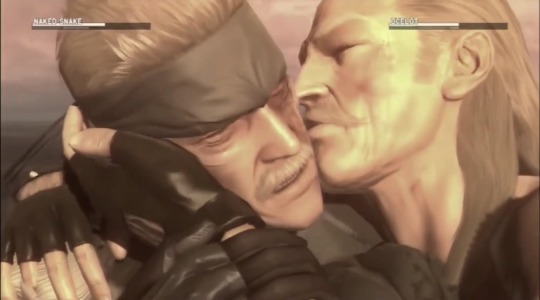
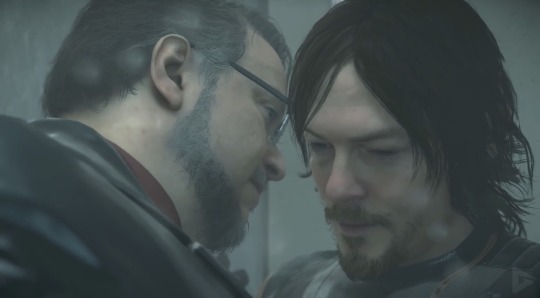
I’m not going to speculate on Kojima’s own sexuality, I’ll leave that to himself, but his games are famous for being very horny, homoerotic and having a ridiculously high number of bisexual male characters. People will point out that they’re all villains, but that’s just the explicitly bisexual characters. His two main characters, Snake from Metal Gear Solid and Sam from Death Stranding, are also implied to not be straight.
This is where Japanese culture and the extensive lore of Kojima’s works comes in.
Homosexuality is taboo in the west and Japan for different reasons. In the west it’s seen as sinful, but in Japan it’s seen as disruptive. Don’t make a fuss. Don’t call attention to yourself in any way. Don’t mess with the status quo. Most queer people choose not to come out to their families for this reason. And to make matters worse, even if a small majority of Japanese people are in favor of queer people having rights the government is very conservative and it’s even illegal to depict homosexuality positively in some parts of Japan.
So what does Kojima do to appease his government and the culture of his people? He does what people did in Hollywood in the 30’s and make the explicitly bisexual characters villains and make his heroes covertly bisexual.
Kojima always had an interest in sexuality and gender. In high school he wrote a story where all women succumbed to an illness, leaving the men unsure of how to continue. Remember, at the time the majority of women in Japan quit their jobs when they got married and took care of their husband and children. So who was supposed to take care of the house and their sons? Could men just stop craving intimacy or would they have to turn to each other? And how would they make more babies? I’ll get back to that.
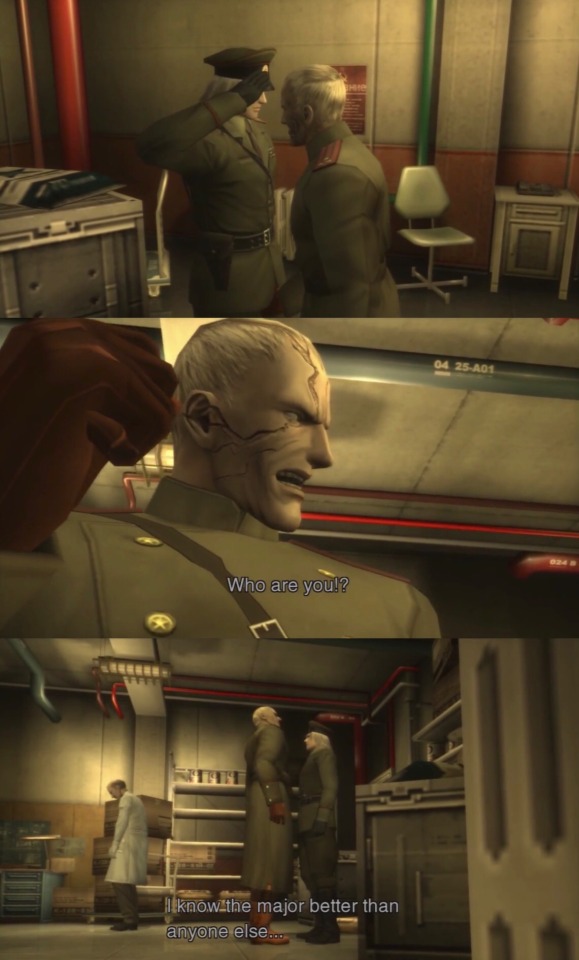
One of the most famous scenes in Metal Gear happens when Snake disguise himself as Ivan, the lover of Volgin. Volgin walks up to what he assumed to be his lover and grabs his crotch, looks confused, grabs him again and asks “Who are you? I know the major better than anyone else” Volgin and Ivan are undoubtedly villains, but their love for each other is surprisingly the most human thing about them. If Snake puts on Ivan’s mask during his bossbattle with Volgin, Volgin will hesitate at first, then double his attacks in anger, but also cry because he’s trying to kill a man with his boyfriend’s face.
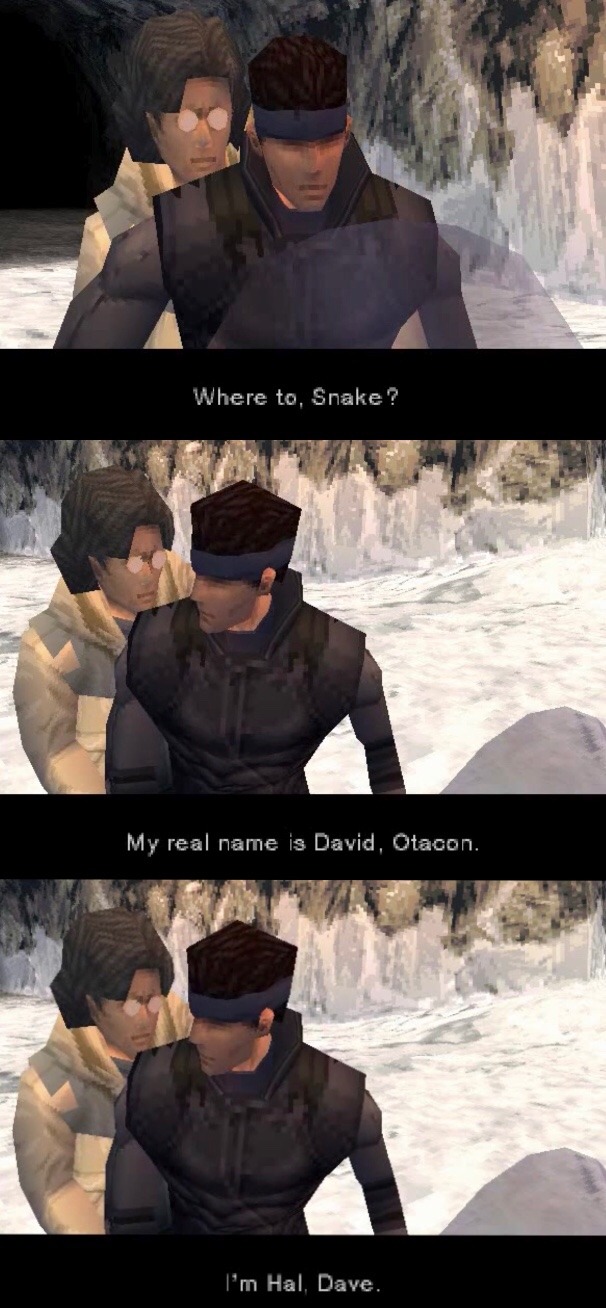
Snake/Otacon is the most heavily implied relationship in the whole series that hasn’t been confirmed. In the first game Snake could end up with Otacon at the end, and since then they’ve moved in together, raised a child together, talked at length about how they taught each other to love, teased each other about their libido, and the list goes on. They also notably get call-backs to two other canon romantic couples; Raiden and Rosemary when Otacon tells Snake that he won’t be let back inside before he takes a shower (Rosemary wouldn’t let Raiden back in because he got pee on him), and Volgin and Ivan when Otacon says he knows Snake better than anyone else. My point being, Snake and Otacon are very heavily implied to be a bisexual couple.
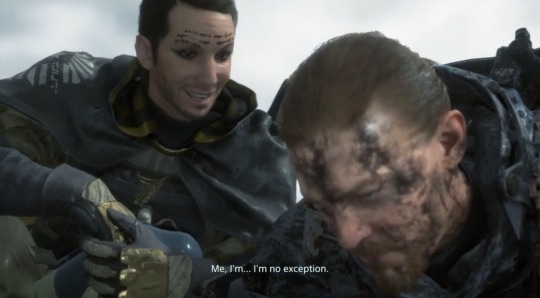
Then there’s Death Stranding. The game is definitely written by a more mature Kojima who has been hanging out with a lot of Americans. His view of sex and love is more nuanced and he understands that there’s a difference between sexual and romantic orientation. We still got Higgs, a flamboyant villain who acts very predatory and is heavily implied to be bisexual, though never confirmed, and Sam who’s implied to be asexual (he has an Ace of Spades sticker on his bike) and biromantic, and we get our first confirmed good bisexual character, Die-Hardman.
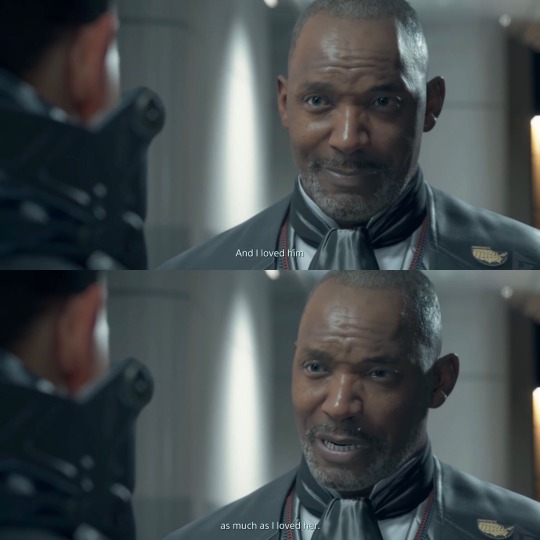
Kojima never got to play around with gender much in Metal Gear Solid, but he made up for that in Death Standing. Remember that story he wrote in high school? We see a lot of inspiration from that here. The solution the men came up with for having healthy babies in the story was to have men carry pods around on their stomachs where the fetus could grow in the most natural way possible.
There’s still women in Death Stranding but there’s a lot of men carrying babies around on their stomachs, men forming family unions, and the main character Sam acts more like a stereotypical mother than father. There’s literally a scene where Deadman puts a hand on Sam’s pod like it’s a pregnant belly and basically asks him “The three of us are a family, aren’t we?”
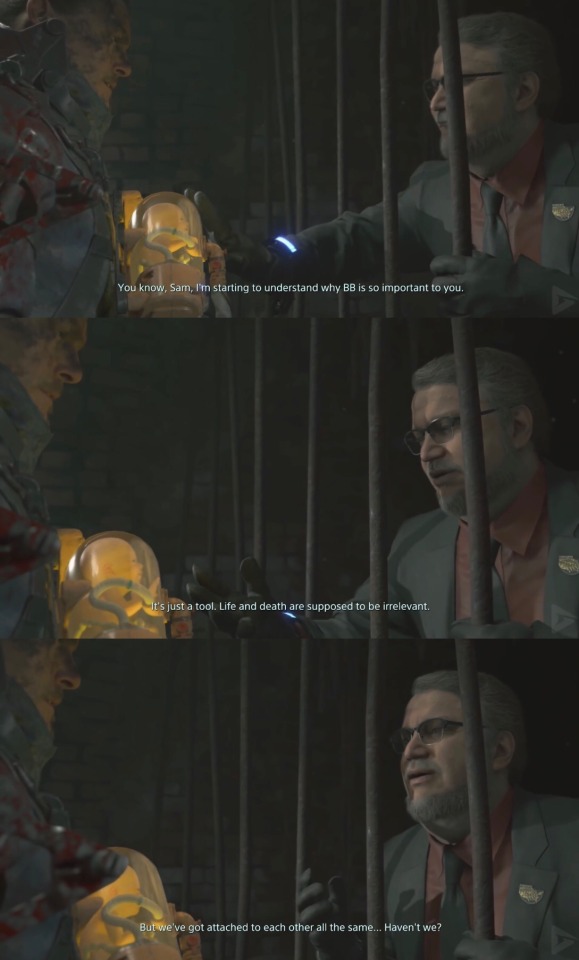
Sam later tries to give the baby to a woman, Fragile, but she only sees it as babysitting and gives it back, so Sam gives it to Deadman who declares it “our little one”.
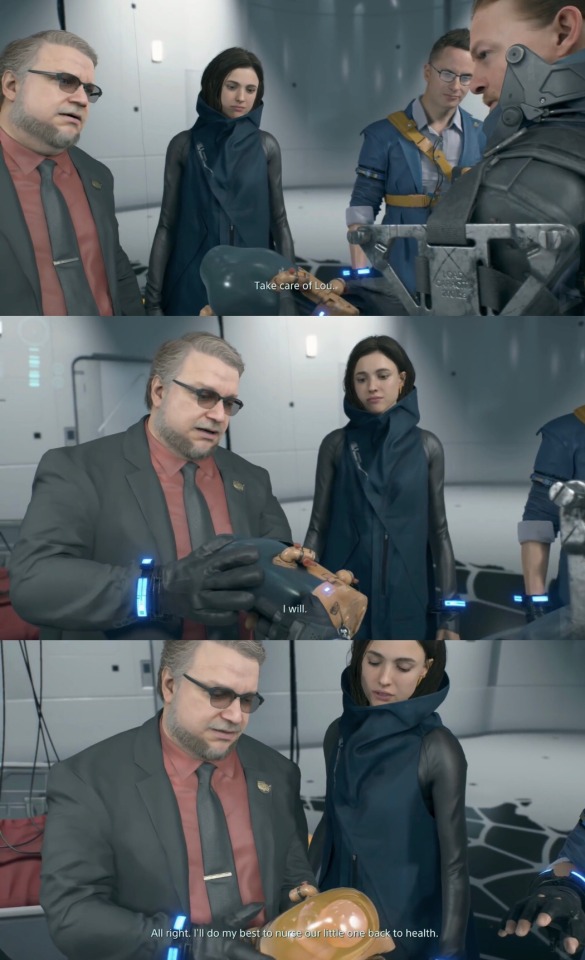
By the end of the game the three of them are seen together, depicted as two parents holding their child. Throughout the game people are constantly trying to hug and touch Sam but in the end the only person who gets a hug is Deadman.
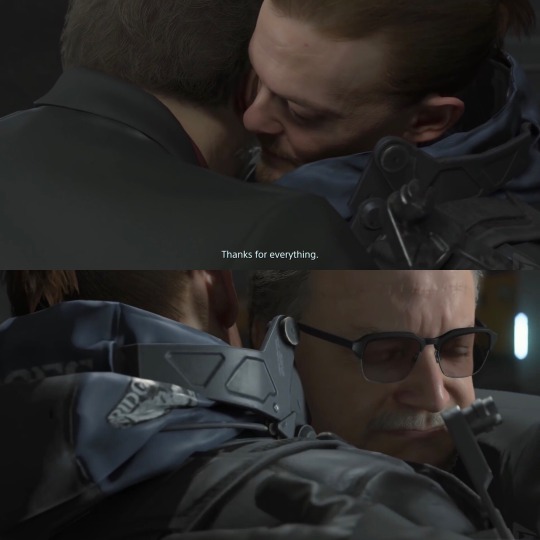
It’s also worth noting that in the universe of Death Stranding Sam and Deadman are believed to be a couple before they actually are. Deadman made sure of that so no one would question why they spend so much time together.
There will no doubt be more bisexual men in Kojima’s next game, and I’m curious to see if there’ll be any development in how openly he depictes queer characters. He’s a middle aged man so no matter what his own sexuality might be I don’t expect him to easily shake the expectations of Japanese society off, but he has started hanging out with a lot of Danes, most notably Nicolas Winding Refn who despite making extremely violent movies is very open minded and has, when asked, been very honest about his own sexuality (to spare you the pain of digging though Danish interviews, he’s a straight, slightly bi-curious man with an interest in BDSM, but who’s also satisfied leaving a lot of his fantasies to his imagination because his movies gives him an outlet for a lot of it).
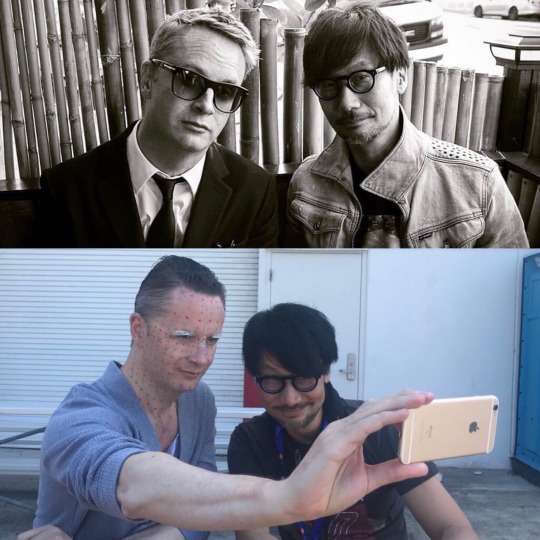
You can see a lot of Scandinavian/Nordic influences in Death Stranding and I’d be surprised if Nicolas didn’t expose Kojima, intentionally or unintentionally, to the Scandinavian view of homosexuality. I can best describe it with a news report I once saw on national television. Parents were worried about a dangerous road that their children had to cross every day to get to school but the government wasn’t doing anything about it. The parents they interviewed were a gay couple but they were treated exactly like any other worried parents. No fuss, no spectacle. Please think of the safety of these parents’ children.
I can imagine that approach would go over very well with a middle aged Japanese man who clearly wants queer people to be able to live happy, fulfilling lives with families and children but doesn’t seem to want to upset his society.
Other people have pointed out that Kojima and Nicolas seem to inspire each other a lot and have taken an interest in each other’s cultures, and Nicolas was the first person to announce publicly that he’d be in Kojima’s next game, so I’m really interested in seeing what that will do, if anything, to how comfortable Kojima is with depicting his queer characters. Something certainly happened once he started socializing with a lot of Americans.
I am of course not saying Kojima is a saint who’s doing everything right, but he is an interesting guy to follow.
8K notes
·
View notes
Text
About Jaune ships...
I have opinions. You may not agree, but they are mine. They may change in time, but not now.
LANCASTER ( RUBY X JAUNE )
The old tried and true. I mean, what's not to like? Cute girl falls for first guy she meets at Beacon? Classic romance trope, and after reading how much Ruby loves romance stories (I consider certain parts in the manga canon), it makes sense. In fact, after Arkos sank (A moment of silence, please . . . Thank you), many moved to Lancaster, which isn't bad. Happens all the time in fandoms. Sad thing, though, is far I think she'll last. If we're talking Volume 5 or earlier, then maybe. However, I feel if Ruby were to have an endgame in romance, it would be RoseGarden (I have opinions on that as well, but today isn't the day to discuss that), mostly because Oscar bumped Jaune's role from male lead to male side. Not to mention that while Jaune is becoming a beast in his own right, Ruby is a different creature altogether and evolving her character more rapidly and chaotically than anyone else (Must be all that screentime).
TLDR: I want it to be canon, but I might just be hoping.
WHITE KNIGHT ( WEISS X JAUNE)
Doofus in tin foil meets princess who hates daddy (Am I in the romance section of the library? You know, the corner for adults only?) No, but I do like this ship. I'm always a sucker for the fantasy genre, and using a zero to hero male makes it relatable. I also kind of ship it because the same reason I ship NaruSaku in the Naruto fandom: he likes her and he's willing to go the distance. But enough about that; instead let's talk about canon. Will they hook up? It's a soft maybe for me, for two reasons. 1. Rosegarden is most likely to be endgame, and after Ruby and Pyrrha, I'd say Weiss is Jaune's next to be his love interest. 2. Weiss has warmed up to Jaune. Sure, not lover or crush level (Yet), but she's definitely changed her opinion on him. In Volume 1, Jaune was bugging her, like all the time, which I could see as him getting mixed signals on (Exhibit A: Tall, blonde, and scraggly). When Volume 5 came around, everyone jumped onboard because he saved her life (Don't lie, because I'll admit that I did it, too). Not the best reason, but still reason enough, I'd say. Then in Volume 7, she hangs out with him and Oscar to the movies (It was either that or awkward Bumbleby all night. I feel ya, sister). Nothing romantic happens, but it does show how much their relationship has developed. If Weiss is Jaune's endgame, then they have set the pieces up perfectly to do so.
TLDR: High likelihood to be canon and I'm a sucker for Knight/Princess ships.
KNIGHTSHADE ( BLAKE X JAUNE)
This is the part where I say definitely not. Not in a million years, but I'll explain why I like the ship, though. As for why it won't work, the answer is Bumbleby. They haven't kissed yet, but you know they're going to eventually (Because if they don't, the fans will attack like a swarm of hornets). But here's the question you might be asking now: why do I ship this? Well, it's part of the allure of "opposites attract" ('Cause I'm dressed like a cat!). Blake is an intelligent, outspoken, and agile ninja with a criminal history of terrorism who spends her free time reading novels. Jaune is a B at best on his tests, soft-hearted, and ground-based knight who's worst crime is fraud (Still a crime, but peanuts compared to literal terrorism) and spends his free time hanging out with his team. Day and night. But they also tried that with Sun for a season and a half and it didn't last (BECAUSE BEES).
TLDR: Not even a snowball's chance in the summer sun, but so much story potential if you do (Which I do)!
DRAGONSLAYER ( YANG X JAUNE )
This, I would say, is the opposite of Knightshade, where Jaune is the day and Blake is night, here Yang is the Sun and Jaune is the Moon (Like their crests! Remember those? Y'know, when they were relevant?) Will it work? Even less so than Knightshade. However, it does open up some interesting paths considering how... provocative Yang can be, and Jaune, compared to the other guys, is the nerdiest, geekiest dude at Beacon. It's like the cheerleader/nerd romance, except the cheerleader is the captain of every sports team... and rides a motorcycle. The Volume 8 preview introduced us to Yang and Jaune riding motorcycles and we went nuts over it. Yang was back in her element, roaring down the street, riding on walls, popping off tricks with Oscar riding- Back to what I was saying, people were asking, "How did he know how to ride a motorcycle?" and the elementary answer is "He didn't." He almost fell off his bike from a small box in the road. True, anyone would, but look at how he reacts: he stiffens, he refocuses on the road. This kid literally started riding at breakfast, and I DARE you to prove me wrong. But hey, great fic material right there, though, eh?
TLDR: Never gonna happen, but I don't care. All I care about is writing that they love each other. And they also fu-!
ARKOS ( PYRRHA X JAUNE )
I'm sorry, I need a moment. . . . Alright. Do it for her. This ship... was perfect. Probably the best ship out them all. I legit almost cry every time I think about Volume 3. Pyrrha was everyone's favorite. Her background, her interactions, her choreography, everything! But, of course, like everything in our lives, she was too good to be true. But let's honor her memory by talking about her ship, Arkos. Pyrrha was the champion of the world, the Brothers' and Oums' gift to Remnant. She could do no wrong and she HATED it. Her plight was with how she was seen. Everybody knew her! Everybody, except Jaune. And he only figured out she was "a big deal" was because Weiss had to spell it out for him! As time went on, they became the best of friends, two peas in a pod, the perfect odd couple! They worked together and trusted each other, they cared for and supported each other, they lo- No. No, I can't say it. It's been years, and it still hurts. So, I'll explain something else: the reason why Jaune SHOULD NOT be shipped right now. That reason is Pyrrha. Jaune was helpless to save her. He's suffering from survivor's guilt and he's still grieving. In Volume 4, he would sneak away and train until late at night to scroll recording of her. In Volume 5, he confronted Cinder and got Weiss almost killed because he let his grief for Pyrrha take control of him and let his emotions run wild. In Volume 6, he finds the Pyrrha statue and he... I don't know how to say this, but he let's go. He accepts that Pyrrha is gone and he's starting the healing process. He's finally ready to move forward.
TLDR: T.T I never felt that it was wise to wish too much~
MARTIAL ARCS ( REN X JAUNE)
I'll be honest, I don't really ship it. Yeah, it's cute, and it falls perfectly into the "if I had to pick a guy" part of me, but to be honest, I don't ship it. 10% because Renora and 90% it just doesn't click with me. They both just seem too soft, too quiet, too introverted. Best friends? Yes, definitely! But lovers? Eeeeeh, not really.
TLDR: I will only ship as neccessary.
NORA'S ARC ( NORA X JAUNE )
I've only just got in this deep with the fandom only recently, so I don't know if a lot of you know me. Heck, I'm probably just some RWBY fan you happen to spot as you move through your dash. However, old or new, I want to be made absolutely positively clear on this. Of all the ships here, this has got to be my-
O T FUDGIN' P
Wow! Never thought I'd feel so strongly about a crack ship like this. And yes, as sad it is to say, this is a crack ship. Renora was planned from day one, so it can't be helped. At least it didn't blast me in the face all of the sudden (OH NO, NOT THE BEES! AAAAARGH! THEY'RE IN MY EYES!). But why this ship? Well, for one thing, it's that whole opposites attract thing with Nora as the bubbly, outspoken, airhead powerhouse and Jaune as the soft spoken, introverted, nerd tactician. But wait, there's more to this trope, because it can go deeper: Order VS Chaos! Who makes all the messes? Who cleans up those messes? Who follows all the rules? Who makes their own doors? It's just. So. Damn! GOOD! One sad thing about this ship though is that it's not only not canon because of Renora, it's anti-canon because Renora. Every fan fic of Nora's Arc requires an explanation for Ren and Nora to not be together-together, like you have to write a formal apology to the FNDM for liking something that's different from what is canon or commonly accepted. If that's the case, then I'll be the anarchist here!
TLDR: I LOVE IT! What's that? Not canon? Who gives a damn?! I just explained why Jaune won't be shipped anyways! Now, if you'll excuse, I have some fan fics to find.
ARCFALL ( CINDER X JAUNE )
Oh, here it goes! Now, if we're talking ships that'll never happen, this is where we find better reasons than "it's not canon" and "character development". No, this... This is a declaration of war. Allow me to explain. Cinder Fall is evil. Like, down to her core. She wants power and she'll cut through anyone to get to it. Including Pyrrha. This woman sank Arkos by means other than "X and Y kissed, so..." She killed X, leaving Y alone. And her interactions with Jaune tell me she wouldn't even be worth a hate-bang. But, as Momma always, there's a thin line between love and hate. This is where the appeal comes in. Cinder is evil with no past, which leaves the previous chapter's of her life story blank to be filled in. Jaune is good with a troublesome, albeit easy past, but untapped potential for more. It's another opposites attract, but different from INTRO VS EXTRO and CHAOS VS ORDER; this is GOOD VS EVIL. Who will win this battle of wills; will our hero purify the tainted heart, or will he slip deeper into darkness, never to return to the light?
TLDR: Should be a NOTP, and yet the allure pulls me in.
What do y'all think? Do you agree? Let me know!
#rwby#jaune arc#my thoughts#jaune arc ships#ruby rose#ruby rose x jaune arc#weiss schnee#weiss schnee x jaune arc#whiteknight#white knight#knightshade#dragonslayer#bumbleby#blake belladonna#blake belladonna x jaune arc#yang xiao long#yang xiao long x jaune arc#yang xiao long x blake belladonna#pyrrha nikos#arkos#Pyrrha nikos x jaune arc#nora valkryie#nora's arc#nora valkyrie x lie ren#renora#nora valkyrie x jaune arc#arcfall#cinder fall#cinder fall x jaune arc
307 notes
·
View notes
Text
Examining the history of queer comics in the US
As previously mentioned, I am interested in creating graphic novels or comics during my practice as an illustrator. As a Nigerian, I also wish to include Nigerian elements in my comics and social commentary about the state of my home country. I want to comment on the injustices being faced by minority groups in tasteful ways in both metaphorical - like some of my favorite superhero comics- and literal as comic journalism. A particular social injustice I am interested in that the Nigerian government seems unwilling to budge on is its treatment of LGBTQIA+ people.
Considering the laws set in place against LGBTQIA people in Nigeria, a graphic novel about the situation will be controversial. I am intrigued to research how entertainment media (specifically, comics) navigated representing queer issues and topics in other countries that previously had unfavorable laws and attitudes towards queer people but have changed over time
The focus for this post will be the United States of America with a look at the correlation between the developments in the representation of queerness in comics and other mass media and the change in the country’s attitudes towards queer people.
In 1954, major U.S. publishers formed the Comics Magazine Association of America and its censorship arm, the Comics Code Authority (CCA 1954). This has been said to be in response to concerns over the explicit violence and sexual themes in depictions of superheroes (Bramlett, Cook and Meskin, 2016). The sexual themes that seemed queer in these comics were largely sub-textual and highlight the prejudice and paranoia against queer possibilities like what the Nigerian government currently emulates. This act of censorship brought to a halt any subtle references to gender nonconformity and same-sex attraction in mainstream comics.
Because of the restrictions in mainstream publishing, queer comic strips started to appear in underground comics and adult magazines in the 1960s. Chute (2008) talks about the rise of underground comics during this period as a reaction to the censorious content code that debilitated the mainstream industry and describes them as an influential cultural vehicle, challenging and arresting because they meditated on the violation of taboo. According to Murphy (2014), the world’s first gay comic strip was arguably Harry Chess: That Man from A.U.N.T.I.E., (Fig. 01) published from 1965 to ’66. However, other scholars like McGurk (2018), have pointed out earlier presences of queer comics - even though subliminal- like Lucy and Sophie Say Goodbye (Fig. 02) which was published weekly in newspapers in 1905, written and drawn by an unidentified artist. In the same decade as Harry Chess, Tuoko Laaksonen illustrated and released another popular gay comic series titled 'Kake', under the pseudonym, Tom of Finland.
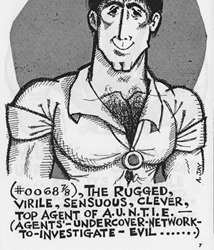
(Fig 01) Harry Chess That Man from A.U.N.T.I.E. https://glreview.org/article/the-lives-and-times-of-harry-chess/
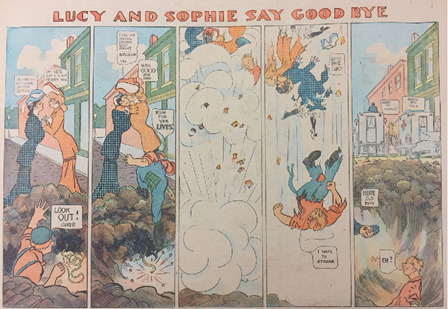
(Fig. 02) Lucy and Sophie Say Goodbye, May 21, 1905. Chicago Tribune.
Unlike Lucy and Sophie Say Goodbye, which could be interpreted as an exaggerated parody of women's social behavior, Harry Chess and Kake were inherently sexual and left little for subtext. Murphy (2014) describes the publication of Harry Chess as a key shift in gay publications and gay politics, and Ajuan Mance in The Routledge Companion to books noted that the explicit sex in strips of the two comics “created both a space and a demand for broader portrayals of gay men’s lives”. (Bramlett, Cook and Meskin, 2016).
To provide context for where the United States was in laws concerning queer rights in the ’60s, Illinois had just become the first U.S. state to decriminalize homosexuality by repealing its sodomy laws, and several milestone protests including the Stonewall Riot occurred during the decade The Supreme Court had also ruled in favor of an LGBT magazine when a suit was filed against them after the U.S. Postal Service and FBI declared the magazine obscene material. (Milestones in the American Gay Rights Movement | American Experience | PBS, 2021). There had been little progress in legal rights compared to the country’s present status, but queer Americans were visibly fighting for them.
The late 1970s and early 1980s saw the next wave of queer comics like Wendel, It’s a Gay Life, Leonard and Larry, Poppers and Chelsea Boys, which were all published in gay magazines. These comics reflected their primarily gay male readership in that the characters “attended gay pride celebrations, shopped at LGBTQ bookstores, and responded to the AIDS crisis, the Defense of Marriage Act (DOMA), and Don’t Ask/Don’t Tell, all while falling in and out of love.” (Bramlett, Cook and Meskin, 2016).
It was not until about 28 years later in Marvel’s Captain America Vol. 1 #270 (1982) that either of the large mainstream comics publishers (Marvel and DC) featured a story-line depicting queer or trans characters (Bramlett, Cook and Meskin, 2016). In this issue, Captain America helps his childhood best friend, Arnie, by rescuing Arnie’s close friend, Michael. Through subtext, it seemed to become clear to Captain America that Arnie and Michael were, in fact, a couple. (https://marvel.fandom.com/wiki/Captain_America_Vol_1_270).
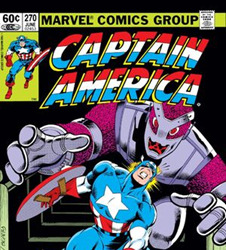
(Fig. 03) Cover of Marvel’s Captain America Vol. 1 #270 (1982)(https://marvel.fandom.com/wiki/Captain_America_Vol_1_270).
Throughout the 1980s, more queer characters were depicted, although indirectly and still with subtext like Captain America’s Arnie. The CCA, in response to the greater inclusion of LGBTQ characters and themes in the film and other popular media forms, revised its Code to lift its prohibitions against queer characters and content. CCA-approved comics however were to avoid the graphic depiction of “sexual activity” and that depictions of adult relationships, “be presented with good taste, sensitivity, and in a manner, which will be acceptable by a mass audience” (CCA 1989).
Over the years to date, DC and Marvel have introduced characters explicitly stating their orientation, including Northstar, an X-Men character; members of The Runaways and the Young Avengers; and notably Batwoman, who came out as a lesbian. The popular Archie Comics in 2010 introduced a gay character named Kevin Keller (Fig. 04) who eventually had his spinoff comic in 2012. Ajuan Mance noted the debut of Kevin Keller as queer attracted a higher level of attention than any Marvel or DC character (Bramlett, Cook and Meskin, 2016). In 2014, Kelvin Keller got married to his spouse in the Life with Archie series (Fig. 05) a few years after New York and other US states legalized same-sex marriage and a year before the Supreme Court declared same-sex marriage legal.
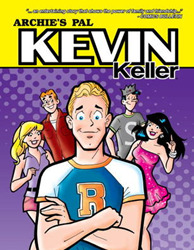
(Fig. 04) https://www.goodreads.com/book/show/11661956-kevin-keller
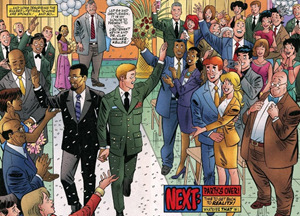
(Fig. 05) https://womenwriteaboutcomics.com/2019/06/the-wedding-issue-pride-edition-kevin-keller-and-clay-walker/
Taking this study for use in the Nigerian context can be applied in different ways. In the US, when the laws were restrictive and limiting towards queer content, the creators of comics and graphic novels under mainstream publishers had to operate in line with the laws. The creators could merely represent queer people through subtext. Unambiguous representation was only viewed through underground magazines from the ’60s up to the ’80s. In today’s age, Nigeria still has comparable, if not more regressive laws, but the Internet provides a similar and arguably better platform than the 20th century underground comics did.
The ease of access and ability to self-publish can cut out the publishing middleman, and I can illustrate distribute the stories I want via the Internet and social media platforms. Of course, if I am fortunate to secure a publishing deal for other ideas I have, I can employ subtext to include queer elements.
I will carry out more research on the best ways to present these proposed comics. Do I go in the explicit and sexually charged direction like Harry Chess and Kake to show a boldness and an unapologetic display of Nigerian queerness? Do I go the route of illustrating average Nigerian queer people to reflect their humanity hopefully to convince prejudiced people that queerness is not an abnormality? Or do I represent queerness in my comics for the Nigerian queer people to identify themselves in the media? These questions relate to the audience I want to reach because they will inform the content I want to create.
References
Bramlett, F., Cook, R. and Meskin, A., 2016, The Routledge Companion To Comics, Taylor & Francis Group.
Chute, H. 2008, "Comics as Literature? Reading Graphic Narrative", PMLA : Publications of the Modern Language Association of America, vol. 123, no. 2, pp. 452-465.
McGurk, C., 2018, Lovers, enemies, and friends: The complex and coded early history of lesbian comic strip characters, Journal of Lesbian Studies, 22:4, 336-353, DOI: 10.1080/10894160.2018.1449502
Murphy, M., 2014, The Lives and Times of Harry Chess, The Gay & Lesbian Review , 21(2): 22– 24.
Pbs.org. 2021. Milestones In The American Gay Rights Movement | American Experience | PBS. [online] Available at: <https://www.pbs.org/wgbh/americanexperience/features/stonewall-milestones-american-gay-rights-movement/> [Accessed 12 January 2021].
25 notes
·
View notes
Note
I'll always remember Devin Grayson as the woman who wrote Nightwing getting raped by a supervillain and then tried to pass it off as "wasn't rape, just nonconsensual"...which is LITERALLY THE DEFINITION OF RAPE, YOU HACK!
MSL: Male rape is a topic rarely touched on in comics. Why is it suited to bring it into Nightwing?
DEVIN GRAYSON: For the record, I’ve never used the word “rape,” I just said it was nonconsensual (I know, aren’t writers frustrating? *smiles*) [x]
Yeah there is no other word for what happened in Nightwing #93 other than rape...I can’t imagine why she would say otherwise. She did technically apologize, but that was ten or so years later. So she eventually, finally did come out and just admit what everyone already knew, but she was still way too late to actually fix any of the damage she caused with how she completely mishandled things. I also don’t think her little apology begins to cover all the issues I have with her.
Devin’s characterization of Dick is just so, so freaking twisted to me. Really, I don’t think there is a Nightwing writer I despise more than Devin Grayson. The interviews I’ve read from her give me the creeps:
DG: The way I think about him [Dick], he likes everyone, he’s sort of a contact junkie - just this incredibly physical (and attractive) person who lives wholly in the corporeal plane and responds with - processes things in - his body before his head or heart. I imagine that he can be hypnotized by a touch the way other people can be stopped dead in their tracks by the sight of money or the promise of true love. I think he likes kicking and kissing in almost equal measure - except kissing edges out ahead because you can do it for longer and it leads to nicer things. [x]
Yeah that’s fucking unsettling. This is Devin being gross and projecting her sexual fantasy’s onto Dick. And she very much invented this extreme view of Dick as obsessively physical. Pre-52 Dick was always written as a master strategist, an unparalleled leader, one of the best detectives in the world, outside of Devin’s writing. Her fantasy version of Dick doesn’t mesh with that...Dick wouldn’t be capable leader if he’s “thinking with his body” (whatever that means) all the time. He’s survived this long because he’s intelligent and logical. Frankly, Devin’s take on things doesn’t even make any freaking sense. But it gets worse:
DDG: I’m writing a novel for WB right now that he’s in and I have one scene where Batman has to stop a fight before it gets out of control, and most of the people he can just yell or glare at, but with Dick, he just stands really close behind him and Dick freezes. That’s not supposed to be a sexual thing (though it is kinda hot! ::laughs::), it’s an understanding on Bruce’s part that his physical proximity will speak just as quickly and loudly to Dick as his voice, maybe even be processed faster.
What the actual fuck. You’ve probably guessed it based on how that little scenario played out. Devin ships Dick with Bruce.
DG: And now think about being a very physical and naturally gregarious and loving person and growing up with someone like Bruce. Then add in the confusion about his status - a “ward” is something you stop being the minute you turn eighteen. Having already lost his parents and then hurling into adolescence at the speed he did...in my personal version of the story, he develops sexual desire and social anxiety about the future at the same time, and this leads to tremendous confusion, on his part, about his role in Bruce’s life. He can’t be a ward forever, in the back of his head he knows he won’t be Robin forever...what is he to this man who is at once his best friend and personal savior, personal god? “Son” is what they eventually settle on, but I think when Dick was in his late teens, the idea of “lover” must have run through his mind (which means, really, as we’ve already discussed, it ran through his body).
Wild that Dick is usually written as incredibly intelligent and emotionally cognizant (was able to puzzle out Damian’s complex motivations and needs when no one else in Damian’s life could for example) and yet Devin thinks he’s not able to sort out that he’s not supposed to make sexual advances towards his father. And by wild I mean stupid as fuck. And, just fyi, Devin goes with the version of events where Bruce took Dick in when he was eight years old! So he’s pretty fucking young when this is all happening! Just when you thought it couldn’t get more disgusting.
Eventually, much later, Dick gets distracted by other relationships and is able to ease up enough on Bruce for Bruce to relax into his own comfort-level of kindness and affection again (once the threat of sexuality has been removed) and they carry on more or less unharmed. But the relationship remains incredibly powerful and intense for Dick, who ends up feeling apologetic, rejected, and confused on top of all the other issues we already know exist between the two of them. Dick responds to Bruce - or really I should say Batman, since that’s who his relationship is with - on every single level.
So, according to Devin, Dick views Bruce as his “personal god” and is incredibly submissive to and possessive of him. That’s why Devin’s writing is littered with scenes like this:
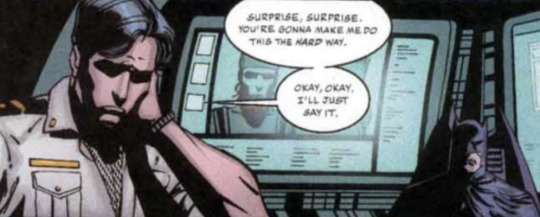

Gotham Knights #17
Where Dick acts incredibly awkward and “apologetic” about dating Barbara, because of how he previously made sexual advances towards Bruce in Devin’s fantasy world. Also with Devin, Dick spends a lot of his time stuttering every time Bruce is in the room, even though he’s usually a smooth talker, very chatty, and that’s because of the supposed “intensity” of Bruce and Dick’s relationship. And then there are scenes like this:

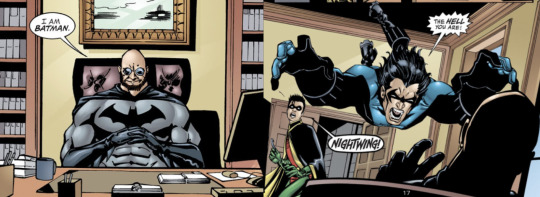
Gotham Knights #18
Where Dick uncharacteristically and disproportionately loses his cool at the slightest insinuation against Bruce and is reduced to an angry hot head. Dick has been noted to be incredibly level headed; he’s also famous for being a mediator among the hero community...this behavior is a complete departure from the way he would normally act under other writers. Dick’s also been one to level plenty of criticisms towards Bruce himself. This sudden personality change where Dick thinks Bruce can do no wrong, where no one can criticize Bruce in Dick’s presence without him absolutely blowing up, where he suddenly can’t control his emotions over the littlest things...it really exists primarily in Devin’s writing. It’s incredibly OOC behavior and it’s rooted in Devin’s sexual fantasies frankly.
Devin’s writing is also where Dick, despite being incredibly dedicated and monogamous in all of his previous relationships, suddenly became a womanizer. Literally, everyone was written as wanting to get into Dick’s pants: Rose Wilson was reduced to a giddy teenager because of Dick, random women in the streets would comment on how cute Nightwing was, a mob boss’s daughter who was only 15 years old was obsessed with Dick and made advances, Dick had a one night stand with Huntress because she reminded him of Bruce, Bruce called Dick “Hunk Wonder,” Dick undressed in front of fucking Deathstroke (and there was a newspaper with “Richard Wilson” on it as a sly little wink towards the audience), psycho vigilante Tarantula is obsessed with Dick to the point of raping him, the list goes on. If you want more samplings of how freaking disgusting and sex-obsessed Devin was when it came to Dick, look no further than her gross Inheritance book, where she ships Dick with everyone from Green Arrow to Aquaman (here are some quotes if you’re a masochist). And since Dick “thinks with his body” or whatever, Devin’d write him as receptive (or very oblivious) when it comes to this attention.

Gotham Knights #10
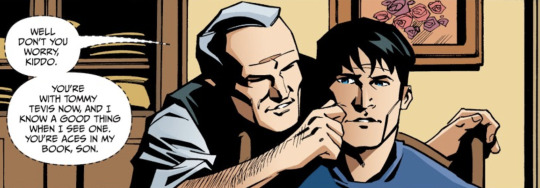
Nightwing (1996) #107
Another thing that made me extremely uncomfortable is how Devin would always have strangers and villains, especially older men--people who Dick very much did not know and wouldn’t appreciate being in his personal space--be all grabby with him. Please leave him alone.
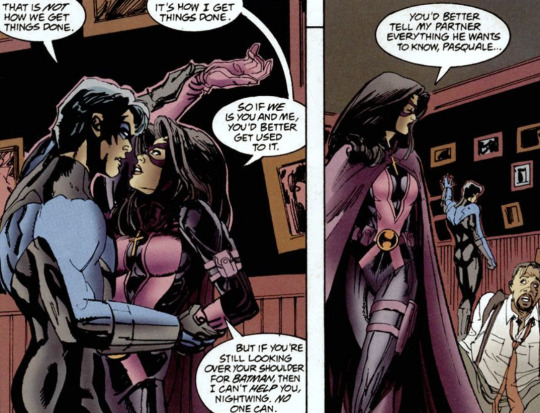
Nightwing and Huntress #2
There Dick is, “hypnotized” in place by Huntress’s touch. Kill me. It is also especially messed up that Devin suddenly turned Dick into some sexual, warm-blooded hot head at the same time as she decided to introduce him as Romani.
Q: How could him being Romani be used to inform his characterization?
It reinforces his “otherness” where Bruce is concerned in what I think is a useful, interesting way...It also presents the opportunity for there to be a slight chip on his shoulder, which maybe speaks to his scrappiness. It also maybe gives him a slightly deeper way to relate to someone like Helena--someone who is white but other--and gives the people who love (or lust after) him a potential cultural excuse for feeling as bewitched as they sometimes do. I also just love the idea of Bruce occasionally calling him “hot blooded” just to mess with him, because Dick would of course deny being so in an extremely hot-blooded manner. [x]
Her feeding into the fetishizing of biracial individuals is just disgusting and wrong. If there’s a racist stereotype available Devin really goes out of her way to make sure she includes it in her writing huh.


Gotham Knights #20
And Bruce being a racist jerk is not charming Devin, it’s terrible. Barbara used slurs also, and was very dismissive of Dick’s reaction to Bruce’s actions...that was also horrible. It’s awful that Dick’s own family would apparently treat him this way. Obviously, Dick isn’t the only one that Devin would write out of character.
It’s all just so messed up to me, I can’t stand it. When I first read her comics, even when it wasn’t blatant like above, I would feel something subtly off...and once I read her interviews I can’t help but notice these horrible underlying insinuations in all of her work, in so many seemingly “innocent” scenes. There are a lot of big things she’s known for (her horrible treatment of Dick’s Romani heritage and his rape for example) but all these subtle, insidious little details that people don’t even really register...they are equally frustrating to me. Seeing sects of the fandom pick up these details (like, the idea that Dick doesn’t understand personal boundaries, the idea that he’s a hot head, the idea that he’s a womanizer, etc.) when I know a lot of it stems nearly solely from Devin’s crappy characterization and writing of Dick...it’s hard.
Q: Further to that, if Dick is gay, what kind of guy is his type?
DG: ...Type isn’t as important as passion and opportunity. Because of his psycho-sexual makeup, the other key factor would be a sense that he means something to that other man, that his “surrender” is making that man happy, allowing him to bring pleasure to someone (as he was never allowed to do for Bruce). There’s also a sense, if I may be so bold, of needing to be “caught” and “held down” - this going back to the trauma of losing his parents...being strong and passionate and heroic and virile and loving with a woman is fantastic, he lives for that. But he lost both parents. There is also a part of him that longs to be pinned down and loved a little bit savagely and hurt just enough to reassure him that he’s alive. Man, I’m totally gonna get fired when this comes out....
Literally makes me want to barf. That is supposed to be a professional, official writer at DC. Could go on forever.
#devin grayson#imma go vomit now#ask#nightwing#dick grayson#batman#rape#rape cw#comics#DC comics#character analysis#characterization#negative
147 notes
·
View notes
Text
All the Many Shades of Gerry - Chapter 19
Chapters: 19/19
Fandom: The Magnus Archives (Podcast)
Rating: Teen And Up Audiences
Warnings: No Archive Warnings Apply
Relationships: Martin Blackwood/Gerard Keay/Jonathan “Jon” Sims | The Archivist, Martin Blackwood/Gerard Keay, Martin Blackwood/Jonathan “Jon” Sims | The Archivist, Gerard Keay/Jonathan “Jon” Sims | The Archivist
Characters: Martin Blackwood, Jonathan “Jon” Sims | The Archivist, Gerard Keay, Tim Stoker (The Magnus Archives), Sasha James, Gertrude Robinson, Elias Bouchard
Additional Tags: Alternate Universe, Library AU, Librarian Jon, Artist Gerry, Trans Male Character, Trans Martin Blackwood, Canon Asexual Character, Asexual Jonathan “Jon” Sims | The Archivist, Ace Subtype - Sex Positive, Polyamory, Fluff, Fluff and Angst, Romantic Fluff, Falling In Love, Boys in Skirts, Kissing, Demisexual Gerard Keay, Minor Character Death, Past Character Death, Canon-Typical Child Neglect, Implied/Referenced Child Abuse, Flirting, Minor Jonathan “Jon” Sims | The Archivist/Tim Stoker, Adventures in Hair Dying, Happy Ending, Banter, Gerry has a lot of sass, Gerard Keay is Morticia Adams, Jon is a very grumpy Librarian, Martin adores them anyway.
Summary: In which Gerry is a kaleidoscope and Jon and Martin can’t help falling in love with him.
He happens to love them back.
Find it on Ao3
[1] [2] [3] [4] [5] [6] [7] [8] [9] [10] [11] [12] [13] [14] [15] [16] [17] [18]
"It’s skew.”
“Come and straighten it, then.”
“I’m spotting, you’re hanging.”
Gerry growls at him. Jon looks rather pleased about it.
Martin, who doesn’t want Gerry to hit their infuriating lover with a hammer, goes over to where he’s hanging the massive painting and tilts it minutely to the left. “Better?”
“Perfect!” Jon pronounces, clapping his hands.
Through some sort of witchcraft, the artist has hung the painting in such a position that it emulates where a window would be in a traditional room. It opens up the space in such a way that it seems less like a store room, and far more like a creative space that someone would actually enjoy spending time in.
The lightning helps too, warm light filtering from the ceiling and corner lamps, and LCD strips illuminating the bookshelves from inside.
All in all, considering this was a utilitarian storage space just a few weeks ago, it seems like a downright miracle.
The three of them lean back against Jon's desk, free of clutter for the first and only time in its life. The bookshelves are empty, and except for his new painting, so are the walls.
The piano occupies one wall, and Gerry hopes to hear it being played often.
Jon reaches out and takes Gerry's hand, drawing them close together affectionately. "How long have you been planning for us to move in?"
"Well, I wasn't planning, per se. Only considering the possibility." Gerry smirks confidently. "I know we're all a little bizarre, but this is the course of most relationships, and we could only spend so much time sleeping over before paying for three flats became superfluous."
"Besides," Martin continues for him. "There's no harm in planning for something you hope will happen eventually. Especially when your new flatmates will be this wildly good looking."
He gestures to himself dramatically, doing a small turn in place. Gerry and Jon laugh with him happily, until he stumbles back into Gerry's side, where he gets wrapped up under an arm.
"So do you like your new space, Jon?" Gerry cuddles around him, twisting the three of them into an odd sort of snuggle pretzel.
"I absolutely adore it." Jon utters happily, sighing in contentment as they all lean there together.
***
At the end of June, Jon hands over his keys and the three of them officially live together.
There's still a lot of settling to be done, even though they've been moving in together for almost six weeks by that point. The boxes are unpacked, but they still need to make it a comfortable home for all of them, a certainty that comes only with time.
Martin and Jon both love their studies, a matching pair that look and feel completely opposite.
Martin opts for a small bedroom, keeping the bed from his old flat, his painting hung opposite. He finds an antique writing desk at a charity store, and installs it for writing poetry or working on his laptop in the evenings.
He adorns the walls with pictures and posters, and random pieces of poetry and music that he loves.
It's a cozy space that he adores, even though he opts to sleep in the master bedroom almost always. The option makes him feel like he has his own breathing room, even if he rarely needs it.
Jon's is more of a true study, with a large desk taking up the majority of the space. His walls are lined with shelves, and he promptly fills them with books and knickknacks. The odd collection includes first edition classics, next to mass market paperbacks and music books, with non-fiction nature and animal books scattered throughout. These are interwoven with seashells, tiny mechanical statues and several flowers preserved in resin, gifts from Martin throughout their relationship.
On the wall above the piano, he hangs framed photos of his parents, himself with Gerry as a teen, and all three of them together as adults. The photo he once took of Martin, Gerry and Tim hangs right in the centre, all his favorite humans in one frame. He hangs the sketch of him and Martin in the park from when they were all courting, as well as the others he has stolen from Gerry over time.
Gerry embraces the chaos and upheaval as if it's all he ever wanted, and really, it is. A home, with the people he loves, noisy and frenetic, loving and comfortable.
In the middle of July, he quits his job at the bar in the middle of a shift, with very little contemplation or preamble.
He smiles at his lovers radiantly when he comes through the door several hours early to find them watching a movie.
"What happened?" Martin queries, clear concern lining his expressive face.
"I quit." Gerry flops down between them, snuggling down immediately.
"But why?" Presses a sleepy Jon, trying to hide a yawn behind his hand.
Gerry shrugs. "I got the job because I was bored, essentially. I wanted to interact with interesting people and I didn't know anyone in London anymore. But tonight I realized how badly I wanted to be right here, with you two." He smiles at them, trying to explain without conveying too many of his sappy emotions. "l honestly couldn't think of one reason to be working at midnight on a Saturday, instead of at home, or out on a date, or literally anything else we could be doing together. So I quit."
"Oh Gerry." Jon whispers, both of them carefully tuned to his moods, regardless of his attempts at seeming unconcerned.
"I don't feel the need to fill my time and chase inspiration anymore. I just want to be with you. Both of you." He kisses first Martin's hand, then Jon's, grinning at them all the way.
"I love you. I'm happy you're home." Jon whispers to him, sleepy and content.
Martin hums an agreement, squeezing his hand and smiling down at him lovingly.
They watch their movie and then go to bed all together, and Gerry knows he's made the best choice of his life.
***
Gerry finds himself with an odd amount of time on his hands while his partners go to work during the day, like normal people.
He decides to take on several art commissions from clients he's actually interested in working for, which thrills Gertrude. He doesn't think it entirely makes up for his boyfriend hitting Peter Lukas in the middle of a showcase, but it's a start.
He also indulges himself and buys a new tattoo machine.
He's not really interested in taking clients again, but… well, he wants it and so he gets it. If it's only to use on himself or the occasional visitor, then that's fine by him.
"You have everything you need to give tattoos now, right?" Martin asks him one early morning.
Gerry is still mostly asleep, clutching a cup of tea and petting Saturn where he perches on his lap. He blinks at Martin, confused.
"I think so. I mean, I haven't used my machine yet, but there's really only one way to test it out." Gerry tilts his head curiously, sunlight glittering in his hair, dyed back to its original black. "Why do you ask?"
"Do you want to give me one?" Martin grins at him a bit shyly.
Gerry sits up straight, instantly wide awake. "Yes. So much."
Martin laughs warmly. "You have the same look on your face that Luna gets when we take out the catnip toys."
Uncaring about how eager he might look, Gerry shoos Saturn to go over and kneel by Martin. "I would be honored to have your tattoo virginity. Do you want me to draw something?"
"Yes," Martin tells him with a grin, "that's exactly what I want. A Gerry Delano original, right on my skin."
"What do you want it to be?" Gerry's teal eyes are bright and slightly manic, and Martin glories in the sensation of producing a new reaction in his lover.
"It's entirely up to you." He responds, pressing a firm kiss to Gerry's mouth. "I want to see what makes you think of me."
"Oh, I like it." He declares, jumping up and going off to find a sketchbook.
Martin sips his tea and smiles to himself, very pleased indeed.
***
"You're just going to let him give you whatever he wants to?" Jon blanches when Martin tells him.
"Relax Jon, it's Gerry, not some evil mastermind. He'll draw something I like. And if I don't, it's not hard, I just tell him no."
Jon, who rather considers that Gerry is an evil mastermind, does not look convinced. "But…"
"Hush, love." Martin tells him firmly.
Gerry, drawing under the window nearby, takes no notice of them. He has a focused frown on his face as he concentrates on the careful lines appearing on his page.
Martin considers it a rare pleasure to just watch him draw, and tries to guess what might be forming on the page before him.
He completely trusts that Gerry knows him exactly well enough to draw him the perfect tattoo. And then he can have his own piece of Gerry, inked right into his skin.
When he sits back down with Jon and Martin a little later, he has a smudge of charcoal above his eyebrow, and Martin gently rubs it away before Gerry has a chance to start talking. He blushes quite uncharacteristically, and Martin knows it means he's been swirling in the frantic rush of his own creativity.
"So I have a proposal for you." Gerry starts, body humming with excitement. "A tattoo in two parts, if you will."
"Yeah?" Martin encourages him, just as interested.
Gerry collects Martin's hand in both of his own, running a thumb over a spot on his wrist. It's the same place that Jon has his own tattoo, which immediately makes Martin pleased. "A small crescent moon, right here. The placement to match with Jon, the symbol for Luna."
Gerry pushes a scrap of paper forward, an elegant crescent moon filling space.
"For the other…" Gerry turns over the larger page, handing it to Martin.
There's an immeasurable beat of silence as Martin contemplates the design before him. A set of waxing and waning moons, connected by a series of dots, lines and more dots making a background of geometric shapes.
He… feels it. He understands now, what Jon had meant, when he described seeing the inspiration for his own tattoo for the first time. It's a representation of some inner part of himself, normally hidden from the world, but carefully unearthed for his lovers, over the course of many months and endless intimacy.
"Martin?" Gerry entreats, leaning minutely closer to him.
"I love it." He whispers, pulling the goth over to kiss him fiercely. They tangle together pleasantly, for several moments, everything else falling away as they get absorbed in each other.
"Not that anyone asked me, but I like it as well." Jon informs them pertly.
"Your opinion is as important to us as ever, baby." Gerry replies, grinning proudly. He turns back to Martin. "Where do you want it?"
Martin considers for a moment, before getting up and pulling off his shirt and jumper, leaving himself bare from the waist up. He still feels a small pang of shyness to be naked in any way, but confidence born of time and perspective drown most of it away now.
He and Gerry stand facing each other. Martin lifts the other man's hand, placing it on his sternum, over his softly pounding heart.
"Right here?" Gerry asks, voice soft.
"Right here." Martin affirms.
***
In the end, Gerry takes them over to Melanie's tattoo shop to work on Martin. He lists a number of reasons, but really, he finds a certain amount of comfort working under the stark lights and amid the buzzing of other machines.
They do the small tattoo first, and Martin sits for it exceptionally well.
Before Gerry starts the sternum piece, an endeavor of several hours, Georgie arrives and drags Jon off to drink coffee and catch up in a nearby coffee shop. Melanie goes into the next room to take another client, and Gerry and Martin are left alone together.
"Ready, love?" Gerry asks as he finishes placing the stencil, bisecting his chest.
"I'm nervous," Martin confesses softly.
Gerry doesn't move his gloved hands, not wanting to contaminate them, but he does press their foreheads together gently, taking a moment to sooth Martin with his companionship.
"Do you want to take a break? You can just sit with the stencil for a while." Gerry leans forward and places a swift kiss on Martin's nose, before retreating from his personal space.
"No, I'm ready." He smiles, biting his lip a little. "I just- I feel like this is a big moment, you know?"
"It is. You're embracing who you really are." Gerry runs a finger along one of Martin's chest scars, considering. "You're choosing to love yourself instead of just tolerating him."
"How can you always tell?" Martin whispers the words, voice heavy with emotion. "How can you put things into words like that, so simply."
"I know you. You think I don't see when you avoid looking in the mirror. You hope I don't notice that you used to hate being naked, even with Jon and I." Gerry pauses, tripping Martin's head up with the tip of a finger, minimizing contact still. "But I see you, Martin. I love you just the way you are. And I want you to love yourself just the same. I'll tell you everyday, show you constantly, if I need to."
Martin is crying for real now, tears streaming down his face. Gerry abandons his sterility, pulling Martin into his arms. He rocks his lover gently, and they are just together for a moment, no need to rush, no distractions. Just them, and the comfort they find in each other.
"I love you too." Martin tells him simply, when they pull apart.
"Good," Gerry grins, kissing him thoroughly, the taste of salty tears on his lips. He stands, pulling off his ruined gloves and going to wash his hands again.
Martin takes a sip of the tea Jon made him before he left, smiling because Jon always makes it with a little more sugar than he allows himself. "I'm ready."
When Jon returns, they're just finished up, the last few moments of buzzing filling the air. He watches them together, artist and canvas, and loves them fiercely.
"How was coffee with Georgie?" Martin queries, taking his offered hand.
Jon relays the details as Gerry finishes, and then cleans up.
Jon and Gerry stand on either side of Martin in the mirror as he looks at it for the first time. Martin nods wildly, when Jon asks if he likes it, and they hug him from either side as he sheds a few more tears.
Jon had once thought that tattoos seemed very boring in comparison to Gerry's normal work, but seeing the design come alive on Martin's skin, full of feeling and depth, he can't help but think of it as the best thing his lover has ever done. Gerry can't help but agree.
"Let's go to the park!" Martin exclaims as they leave, after saying their goodbyes to Georgie and Melanie.
"The park?" Jon asks, laughing. "It's so windy."
"I don't care, I want to feed the ducks and eat ice cream with my boyfriends." He insists, giddy with happiness and adrenaline.
"Okay, but you're picking the flavours this time." Gerry says, taking one of Martin's hands. Jon takes the other.
"Deal."
***
Jon and Gerry find themselves watching Martin once again feed ducks as they sit beneath a tree, more than a year after the very first time.
"Why don't we come to the park more often?" Jon asks from where he reclines between Gerry's long legs.
His arms snake around his waist, and Jon feels very content and comfortable, despite the cutting wind.
"Because," Gerry kisses under an ear softly, "we live in England and it rains more than 100 days a year."
"He looks so happy here." They watch as Martin stoops to offer a piece of bread to a curious toddler. The child is inordinately pleased, and her mother watches on gratefully from nearby as they feed the rowdy birds together.
"Are you happy?" Gerry asks him, unexpectedly serious. "With your life, with me?"
"Gerry! Of course I'm happy with you." Jon sits up, turning in the tangle of Gerry's limbs to face him.
"I'm only checking on you." He runs a gentle finger down Jon's face, then cups his cheek affectionately. "I know how much stress work puts you under and I hate that for you."
Jon looks away from his intent gaze, fiddling with his fingers nervously. "Well, yeah. My job sucks. The worst part is, I love being a librarian! Being surrounded by books, helping people choose something to read or guiding them with their research. But that's so little of my job now, and Elias just finds new and interesting ways to put pressure on me. But I'm not qualified and I know I probably won't get another job in a library, especially not without a glowing recommendation from Elias-"
"And we both know that's never going to happen." Gerry finishes for him.
Jon nods and they just sit together a moment. Gerry lifts one of his hands and kisses each of his fingers and then his palm, until Jon blushes and smiles at him.
"I know you think it's annoying, so you keep your feelings about work inside, a lot of the time. I don't want you to do that anymore, okay? If you have a terrible job, then we all carry that."
"But-"
"Nope, no buts. We are all partners. That means more then dinner dates and living together and sex."
"And punching rich fuckers who hurt our Martin."
Gerry laughs, still reveling in Jon's unexpected protectiveness- and the violent manifestation of it. "Yes, that too. There will be other jobs, for all of us, probably. But our relationship, the three of us. We're forever."
"Like those tattoos that you gave Martin today?" Jon asks, pert glint in his eye.
"Yes, much like that." He smirks brazenly back. "And the one I gave you, and the ones I've given myself, over the years."
Gerry continues, squeezing Jon's hand, "I know that the idea of not being able to provide for yourself scares you, but we're in this together now. You don't have to cling to a job that you hate in case you're left without one at all."
"I-" Jon looks away, uncomfortable to be so well understood. Gerry stits with him, energy easy between them, just holding his hand, loving and supportive.
"I have been considering, that is, maybe becoming a school teacher." The confession is halting, and he offers it with a small shy smile.
"I think that's a wonderful idea." Gerry responds, gentle encouragement colouring his voice.
"I would probably have to go back to school for a year. Get a post-grad in Education. I wouldn't be working for most of that time, and my savings will only go so far, even without having to pay rent." Jon whispers, as if the words will be any less offensive to him if they are quiet.
"You know I can float you, especially for just a year. And Martin too."
"It just doesn't seem fair to burden you with that."
"It's not a burden, it's a part of life. You think you're so old, that you should be settled, but you're barely 30, Jon. You still have time to make new life choices occasionally, and the point of being in a relationship is that you let us support you every now and then." Gerry is earnest and focused, and Jon can't help but believe him, long fingers cupping his face and teal eyes holding his gaze.
Martin arrives then, plonking down next to Jon and giving him a sloppy kiss on the cheek.
"What are we talking about then? Such serious faces."
Gerry nudges Jon, who haltingly offers Martin the same idea he told Gerry.
“Oh, I think that’s a great idea.” He says, eyes alight. “Like, high schoolers, right?”
“Yes, of course. Anyone under 10 is an alien and I don’t want to hear any arguments.”
They laugh at him, their contentment surrounding him warmly.
"You don't have to quit right away." Martin offers. "There are plenty of part time degree programs, and you have to apply first. It all takes time."
"You seem pretty clued up about it." Jon observes, narrowing his eyes at Martin suspiciously.
"Well, if you must know. I've been thinking about getting a business degree."
"Oh my God! Martin, how is this the first we're hearing about this?" Gerry demands, sitting up straight.
"I didn't want it to be a thing until I was sure, and the move was over." He confesses, "It's gonna take a lot of my free time and I wanted to discuss that with you both carefully."
"I'm gonna be living with two thirty year old students." Gerry mutters, shocked. He leans back against the tree again, running his fingers through his long hair.
"I haven't agreed yet-" Jon starts.
Martin speaks up at the same time. "You could get a degree too. We could all be students together."
"No, but thanks anyway." Gerry shudders, grimacing. He perks right back up. "I'll be your sexy study partner though."
"Gerard!" Jon cries, scandalised.
Gerry shakes his head. "As if I've never felt you up while you were trying to study for a test."
"Exactly!" Even Jon struggles to keep up his prim expression at that, and they tumble into pleasant laughter together.
"So," Martin hazards, "are we gonna do this?"
"Well, if you're going to. I suppose we should both get it done at the same time." Jon responds, still hesitant but clearly warming to the idea. "You're really okay with this, Gerry?"
Gerry beams at them both, a soft, special look in his eyes. "I'm more than okay with anything you want to do with your lives. In case you haven't noticed, I'm really very fond of you both."
Jon leans forward in the circle of Gerry's legs, pressing their lips together in a gentle kiss, before turning back to lay against his chest.
Martin shifts around to lean into his side, and Gerry tucks one arm around him, the other around Jon. Jon reaches out to take one of Martin's hands, and the three of them sit wrapped up together.
As ever, their own mutual magnetism draws them forever closer and closer, binding them to one another in an inexplicable tangle of love and affection.
"Do you think it will always be like this, between us?" Martin whispers gently, as the sun begins to set and the landscape sets ablaze before them.
"Probably not," Jon responds, voice warm and content. "Life will keep shifting like a tide, and we'll move with it, but the great thing about us is- we're moored together. Nothing can keep us apart, because what we have is stronger than whatever shifts and eddies might try to take us away."
"The gravity between us is fiercer than any storm, any disaster that might try to shake us." Gerry picks up Jon's train of thought, pulling them both minutely closer.
"Good," Martin says simply, fiercely in love and the happiest he's ever felt.
They watch the sun as it drops below the horizon, sometimes quiet and occasionally sharing some errant thought or another.
They eat ice cream on the way home, holding hands and laughing.
It's warm, and soft and peaceful.
And they're all, finally, home.
4 notes
·
View notes
Text

Name: Eivor Bjorn Hagen
Age: Thirty-Nine
Birthplace: Ice Coast
Eye Colour: Blue
Hair Colour: Dirty Blond
Height: 6’0”
Scars: Diagonal line across his forehead (left side) that crosses over his right cheek *thin line. Straight across the line on the side of his head (Right side). Notch missing out of the top of his left ear. Thick diagonal scar across his upper chest. Small scars liter the rest of his body, hands, legs and arms.
Tattoos: All following tattoos are grey as they do not have coloured tattoos at the time. Back piece: The weeping Heart Tree. Right Side of head: Simple Crow. Left side of Head: Simple Dragon.
Loyal to: King Edric Stark & Queen Freyja Stark
Seat: Ice Coast, Ruling Lord
Relationship Status: Widowed, Unencumbered
Sexuality: Bisexual
Siblings: One Sister (Younger)
Children: Two Sons (Eighteen Months Apart), Lif (Daughter,Deceased)
Other Relations: Mother (Deceased), Father (Deceased), Kiiara Bal (Wife, Deceased)
Religious Views: Gods of the Forest (The Old Gods)
Good Traits: Impassioned, Steadfast, Curious, Straight-forward, Creative Wit, Ambitious, Hardy, Statistical, Blunt, Adentureus.
Bad Traits: Volatile, Insensitive, Untrusting, Merciless, Emotional, Cutting, Disrespectful, Brutal, Unyielding, Stubborn.
History:
The Hagen name never had any nobel power attached to it until Eivor’s eighteenth winter. Before that, they were simple people. His great grandparents were wildlings that had been escorted across through the Wall by Jon Snow. They settled on the southside of the wall and began to work the land. In the short time between settling the land and the war of three kings starting, his grandparents had a few children. They then left to fight in the war . His grandfather ended up dying but Eivor’s grandmother returned once all had settled and moved the family to the Ice Coast. There, with a few other Wildling families, Eivor’s parents grew up on a cattle farm and began to set up House Crow. They became integrated into Westeros. His parents remained on that Cattle farm all their lives and until Eivor was about fifteen he grew up on the farm as well.
The younger years of his life were simple but hard work nonetheless. A sense of hard work and responsibility was instilled in Eivor from a young age. He spent most of his days working the land with his father and most of his nights training with a sword and shield. However, unlike his parents, Eivor was not content to stay on the family farm. He longed for so much more. The stories of how Arya Stark sailed off to the edge of the world integrated him. They sent his mind spinning around what she may have found out there beyond the edge of the map. He longed to sail to such places.
At fifteen, he convinced a small crew of young men to accompany him to sail out from the Ice Coast and go North West to see what might be out there. They were gone for close to ten years. Sailing from island to island. Plundering claimed lands that had no relation to Westros and pillaging whatever resources they could from any other unclaimed lands. In that time, Eivor met and married his wife. Kiiara had three children for him while they ventured from one place to another. Constantly moving. The only home they had being the boat that Eivor and his kin stole. They did make their way back to the Ice Coast when Eivor was about twenty-four.
Upon returning, he found out that the North was about to go to war. The Ruling Lord, at the time of Eivor’s return, was not happy with his actions but delayed his judgement of Eivor and his crew after the war. Without much time to settle at all, he enlisted in the Northern army. Battle after battle on the open sea had trained Eivor well for what was about to come about across the land of Westros. He rose through the ranks as a proficient warrior and man skilled in both battle and war strategy. To this day, Eivor prides himself on the ability to use the land, the weather, and the strengths of his warriors as well as the weaknesses of the enimay to his advantage.
When the war finally settled, Eivor returned to the Ice Coast and found that while away a pledge had swept across his home town and killed a great number of people. His daughter and wife had fallen to its hold. Thankfully both his sons had survived and his sister had taken care of Eivor’s boys while he was away. The trouble, however, did not end there. He still had to answer for his crime of stealing a boat and abandoning his people for years. Though many of the Ice Coast’s men and women called for him to be pardoned due to his acts in the north war, the Ruling Lord would not allow it. Before he could pass a judgment however, Eivor called for a trial by combat. The Ruling Lord against himself.
In a rather intense one-on-one battle, Eivor came out victorious. He earned his freedom and called for a voting for a new Ruling Lord. Yes, by all accounts it should have been him. He killed the last man to rule, so by right the title was his. He wanted the people to choose however. Two other men ran against him but in the end Eivor was voted ruler of the Ice Coast. Taking House Crow as his own, Eivor has been Ruling Lord ever since.
Under his rule, Eivor has managed to expand their reach of trade goods. He has made sure to send Raiding parties to those islands he had discovered in his youth. Their rare treasures have and continue to bring boats to the shores of the Ice Coast to this day. He is known for being very proud of both his sons. His greatest joy in life is being a father to those boys. Though, it does haunt him that he was gone when both his wife and daughter passed away. He has not remarried since. Although he does have a reputation for bedding many and flirting with even more. He is rather shameless with his affections. Eivor is, generally, happy but that itch to see more of the world has begun to once again tingle his skin. The raids to the west are no long easing that itch either. He longs for new lands, new people, and new battle but is held in place by loyalty and family.
Extra:
Spotify
Pinterist
Wanted Connections:
Children: Eivor has two children, both sons. One of them is 20-21 and the other is 22-23. They are the best thing thats ever happened to him, so bring that man his boys.
Ex-Lovers/Current Lovers: What is the proper word for it? Man-whore? Shameless man-whore? I think we will go with that. Eivor is a flirt. He will sleep with men and woman. As long as you wanna sleep with him and he wants to sleep with you, its gonna happen.
Friends/Allies: Bring me friendships that are pure and perfect. Bring me hate/love friendships. Bring me allies that trust each other. Bring me allies that don’t. I want them all. I am a plot whore, come to me everyone.
Sister: Eivor has one younger sister. She is about 33-35. Please contact me before taking her.
Enemies: THe way that Eivor conducts himself may not rub everyone right away. I would love for him to have people that do not like to be around him and find him generally unpleasant because he really, really can be.
Someone Special: For those of you who have watched vikings, I would just die if someone could bring me an Athelstan-esk character for Eivor. For those who did not watch Vikings, I am looking for a character that Eivor would have found on his travels. Someone who believes in a different set of gods than himself and challenges Eivor to think about different beliefs and costumes. I would prefer this character to be male and possible have a romantic interest in Eivor that we could build up to.
7 notes
·
View notes
Photo
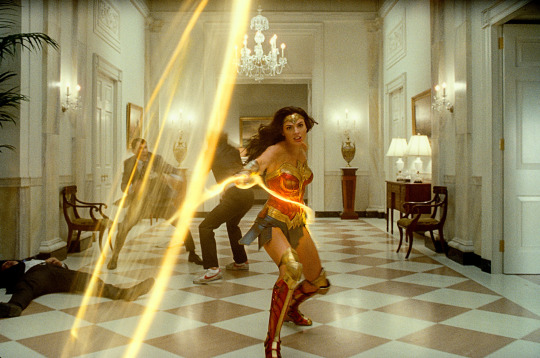
NOTE: This is the second film released theatrically during the COVID-19 pandemic that I am reviewing – I saw Wonder Woman 1984 at the Regency Theatres Directors Cut Cinema’s drive-in operation in Laguna Niguel, California. Because moviegoing carries risks at this time, please remember to follow health and safety guidelines as outlined by your local, regional, and national health officials.
Wonder Woman 1984 (2020)
It took decades for a female superhero movie to make a lasting cultural impact. The honor fell to Patty Jenkins’ Wonder Woman (2017) – no matter what you think of it, the film dispelled any perceptions that a female-driven superhero movie could never be a cinematic phenomenon. Jenkins returns, as does Gal Gadot as Diana Prince/Wonder Woman and Chris Pine, in Wonder Woman 1984. This sequel is at its best when not proclaiming to the audience its self-importance – an aspect commonly found in and that plagues the Marvel Cinematic Universe (MCU) – and, unfortunately, its poor screenplay oscillates between a flighty romp and superheroic maximalism. For Patty Jenkins, whose filmography is regrettably small mostly due to the lack of opportunities afforded to women directors, she could not have envisioned Wonder Woman’s success, nor the impossible expectations put upon her to surpass the first film. As it is, WW84 is an entertaining, if troubled sophomore effort.
Seven decades after we saw her in the first film and after a prologue during her childhood on Themyscira, Diana Prince (Gadot; Lilly Aspell as young Diana) is working as a restorationist at the Smithsonian Institution’s National Museum of Natural History in Washington, D.C. In her off hours, she performs the occasional heroic act as Wonder Woman. One of the newest hires is gemologist Barbara Ann Minerva (Kristen Wiig). Diana and Barbara, from an FBI request, identify a stolen artifact as the Dreamstone – a gem that, according to legend, has the power to grant a person one wish. On accident, Diana wishes for her long-dead lover Steve Trevor (Pine) to come back to life; envious of Diana’s looks and wallowing in self-pity, Barbara off-handedly wishes to be like Diana. Both wishes come true, but in ways profaning the literal meanings of the respective wishes. For Barbara, this means a transformation into one of Wonder Woman’s archnemeses, Cheetah. Elsewhere in D.C., struggling television infomercial pitchman Max Lord (Pedro Pascal) wishes to procure the stone to revive his flagging business.
Robin Wright and Connie Nielsen are barely in the film as Antiope and Hippolyta, respectively. Lynda Carter, who played Diana on the ABC television series Wonder Woman from 1976-1979, has a self-aware moment which will delight fans.
1980s American culture is the nostalgic fixation at this moment in popular culture (with the march of time, each decade seems to be beholden to its own moment of nostalgic media cycles). Think of television shows like Stranger Things; movies like Adventureland (2009) and It (2017). The generation that came of age during Reagan’s America grew up in a time where the veneer of the Soviet-backed Eastern bloc was crumbling from within, and where Reaganomics spurred prevalent materialism and indulgence. Unadulterated greed and desire are in every corner of WW84 – from the terrible attempts at flirting with Diana and Barbara that easily qualifies as harassment, the difficulty in renouncing wishes on the Dreamstone, Max Lord’s inability to balance his business commitments in order to make time for his son, Alistair (Lucian Perez). WW84 captures this consumerist, entitled attitude throughout, and remarks on how corrosive this mindset is. Admittedly, it is simple messaging from the screenwriting team – Jenkins; Geoff Johns (a DC Comics writer and producer for comics, television, and film since 2000); and Dave Callaham (2014’s Godzilla, 2019’s Zombieland: Double Tap) – but they never contradict that central message.
WW84 progresses to its hackneyed, natural conclusion. But along the way, the screenplay is bogged down in the havoc that ensues from fulfilled wishes via the Dreamstone. The film’s impressive, animated start cannot build on its own momentum when – after the fulfillment of Barbara’s wish – it begins to clearly delineate its time between Diana/Steve, Barbara, and Max Lord. In their respective thirds of WW84, each character learns more about their granted wishes and the Dreamstone’s nature. The set-up for each third follows the same process: a monologue dripping with disappointment with their life directions, confusion in discovering their wish becoming true, and the exultation of their wild imagination defying all sense of reality. WW84 cannot help itself slathering on the foreshadowing and the repetitive narrative structure. The screenplay’s sins are compounded by the screenwriters’ inability to properly and consistently define the limitations of the Dreamstone’s powers – leading to expositional dumps occurring in the movie well past their welcome. As morbidly entertaining as watching humanity run amok with half-baked and ill-considered wishes is (credit to whoever choreographed the third act’s mass chaos), WW84’s unpolished storytelling leaves behind a somewhat befuddling mess.
The movie’s relative lightness in its opening two acts, though entertaining, throws away Diana’s characterization of a solitary, somewhat maternal protective figure in favor of a decades-long yearning for Steve. Are we really to believe that she has spent every waking moment since World War I pining – no pun intended – for someone she knew for probably less than a month? Whatever chemistry Gadot (whose performance as Diana remains at a laudable standard) and Pine had in the first film has evaporated into a labored dynamic in WW84, and she is too quickly is prepared to leave behind her life as museum preservationist by day/superhero-if-not-by-night-then-during-non-working-hours for him. Her behavior concerning Steve – and this is not even mentioning the ethically murky fact that Steve’s soul inhabits the body of a male stranger for the entirety of his resurrection – does not square with any notion of human growth, especially as most of the twentieth century has passed Diana by.
Putting aside the amusing transformation of Barbara from a bookish, clumsy gemologist to an unspectacled femme fatale, the emergence of not one, but two, villains weakens the characterizations, motivations, and portrayals of both. Thus, WW84 spends less time sympathizing with Barbara’s status as a social outcast, so too the relationship between Max Lord and his forgiving – at film’s end, at least – son (the only aspect of Lord’s life that exists outside work). The film’s divided attention between Barbara and Max Lord assures that their concluding actions become too cartoonish, depthless. It’s not that I am demanding that WW84 (or any superhero movie) should provide brooding, soliloquizing philosopher-poets for a villain. Far from it, especially when noting what the likes of Christopher Nolan and, more recently (and exasperatingly), Zack Snyder have offered in their interpretations of D.C. Comics characters’ mythos. Instead, Barbara and Max Lord become caricatures, rather than fully realized, flawed individuals who retain strands of their goodness even as their actions plunge them into villainy.
Though lacking a moment matching the brilliance of Wonder Woman’s entrance into No Man’s Land from the first film, WW84 contains its share of pulsating combat scenes. Cheetah’s debut during a confrontation at the White House is crisply edited by Richard Pearson (2004’s The Bourne Supremacy, 2006’s United 93) and shot by Matthew Jensen (Wonder Woman). The fight, unlike so many littering action movies nowadays, makes geometric sense of who is doing what and where. This collaboration of cinematographer and editor reaches its peak with a vehicular fight in Egypt that resembles something out of an Indiana Jones movie (minus the comedy that usually occurs during an Indiana Jones vehicular fight). It is a wonderfully choreographed scene, but one mired in its poor depiction of the Egyptians involved. WW84 concludes with a dud of a fight. This is not because of terrible CGI, or the revelation that their mothers share the same name. Instead, it is the lack of lighting that destroys this moment. The final fight between Wonder Woman and Cheetah is so poorly lit that the combat becomes an amalgam of flailing limbs and incomprehensible movement. Cheetah, who by this point appears as if she wandered off the set of Tom Hooper’s Cats (2019), appears to be nothing more than a ball of spotted fur. It is a disappointing end to an erratic sequel.
youtube
Longtime readers know that I have pilloried composer Hans Zimmer again and again for dispensing with melodies and for relying too heavily on ostinatos, electronics, and musical texture on his recent film scores. I’m a simple person with certain biases: as a classically-trained amateur pianist-violinist, I prefer scores that have musical interest within and outside the context of a film (would I enjoy playing this score in an orchestra and listening to it in a concert setting?). The worst of his imitators and colleagues at Remote Control Productions are on a train to my musical shit list. His score to Wonder Woman 1984 is a rare bright spot (aside from maybe his work in the Kung Fu Panda series) in a decade marked by excess. The film opens with “Themyscira” – a synth-y prelude quoting Wonder Woman’s motif, but one that blossoms into orchestral triumphalism. This cue crescendos from 0:27 to 1:11 on the back of string ostinatos, regal brass, and chorus chanting pianissimo. The orchestra and chorus explode to life at 1:11 in a majestic, ascending melody celebrating the joys of Amazonian life on Themyscira. A hummable, singable melody in a 2020s Hans Zimmer score? Yes! Alongside Wonder Woman’s now-iconic electric cello motif, Zimmer has composed a secondary motif for her beginning at 1:53 in “Themyscira” (and which eclipses the electric cello motif in terms of appearances in the score). Another throwback occurs during the cue “1984”, a jubilant cycling of rhythmic melodies that could easily been in a 1980s film scored by Alan Silvestri, perhaps even younger Zimmer himself. Even when Zimmer is introducing villainous motifs or the motif for the Dreamstone, his contemporary obsession for droning synth is tempered by ostinatos in the strings and winds, rather than ear-splitting percussion.
Zimmer’s love theme for Diana and Steve is “Wish We Had More Time” – and I cannot recall the last time the composer brought forth such affecting romantic music. A languid melody led by strings speaks to Diana’s longing – however one may disapprove of it – in ways reminiscent, but still inferior to, of Italian movie scores during the 1980s and ‘90s (think: Luis Bacalov, Ennio Morricone, Nicola Piovani). One quibble: beginning at 1:13 until 2:12 in “Wish We Had More Time”, the second violin tremolos are much too loud, and are just as audible as the melodies by lower strings, first violins, and winds. Hans Zimmer’s score to WW84 is the most thematically fascinating he has composed over the last decade, and it – not Nolan’s Dark Knight trilogy, not Inception (2010), and sure as hell not the sonic assault that is Dunkirk (2017) – represents the best of what he can be as a film score composer.
The temptation to elevate the dramatic stakes for sequels is present among all the major Hollywood studios. WW84 is not immune to this temptation, but it, at times, resists it. Its ungainly conclusion and dreadful narrative structure reflect those expectations, but one could not classify it as grimdark, such as almost everything Zack Snyder has directed. This is not a Wonder Woman limping her way through apocalyptic or post-apocalyptic times. Patty Jenkins’ sequel, however flawed, unironically celebrates its own corniness and absurdity – one cannot say this about the MCU (which does so only via metatextual humor). Many of us can no longer experience for the first time Wonder Woman emerging from the Allied trenches of WWI, but Wonder Woman 1984 provides a vision of superhero movies particular to creator William Moulton Marston, director Patty Jenkins, and Gal Gadot’s portrayal of Diana Prince. It even allows for faint echoes of the Lynda Carter Wonder Woman series that would not have been appropriate in the first film. Flawed though this film is, its approach, after a decade or so of building cinematic universes of dramatic escalations, signifies a refreshing change of pace.
My rating: 6/10
^ Based on my personal imdb rating. Half-points are always rounded down. My interpretation of that ratings system can be found in the “Ratings system” page on my blog (as of July 1, 2020, tumblr is not permitting certain posts with links to appear on tag pages, so I cannot provide the URL).
For more of my reviews tagged “My Movie Odyssey”, check out the tag of the same name on my blog.
Also in this series: Wonder Woman (2017)
#Wonder Woman 1984#WW84#Wonder Woman#Patty Jenkins#Gal Gadot#Chris Pine#Kristen Wiig#Pedro Pascal#Robin Wright#Connie Nielsen#Lynda Carter#Geoff Johns#Dave Callaham#Matthew Jensen#Hans Zimmer#My Movie Odyssey
8 notes
·
View notes
Photo

Character: Soren
From: Fire Emblem Tellius (Fire Emblem: Path of Radiance and Fire Emblem: Radiant Dawn)
Representation: Abuse victim/survivor, mental illness*
Their Importance: The continent of Tellius was populated by two races: the beorc, who are like real-world humans, and laguz, who shapeshift into animals. Soren was the son of a male beorc and a female laguz. His father only wanted a laguz lover for their great power, and when his young son did not appear to have any powers, he used him as a hostage to lure another powerful laguz to him, before simply discarding the child.
Soren spent his early childhood in a beorc settlement in Gallia, hated by his caretaker–his earliest memories are of her rejecting him and lamenting her lot in life, having to provide for him, and she never showed him any affection, doing the bare minimum to care for him out of a sense of obligation rather than love. However, when Soren was four years old, an elderly sage, well versed in the ways of magic, noticed a mark on Soren’s forehead, and took this to mean the boy was a Spirit Charmer–someone who harbored spirits in their body that ate away at their soul in exchange for their protection and magical power. The sage came to the woman’s home and purchased Soren from her, saying that the boy possessed rare magical talent, and she was ecstatic to give him up. From then on, the sage trained Soren day and night in magic, and though the lessons were harsh, Soren preferred it to his previous life. When Soren was six years old, the sage died of old age. Once Soren ran out of food, he left the sage’s hovel and walked for days until he reached a village, but upon arriving, realized that while he was more literate than most of the people, he could not bring himself to speak even a single word as a result of the verbal abuse he had experienced–he was used to words being hurled at him, and there was never any reason to answer, so he was unused to using them. (This is a sign of an anxiety disorder called selective mutism.)
People noticed the mark on Soren’s forehead and saw it for what it really was–a Brand that marked him as the offspring of an interracial union between a beorc and a laguz. Since this was an unspeakable taboo, the beorc tried to stone him or beat him to death when they saw him, and called him slurs. For at least another year, Soren lived like this, starving and wasting away. One day, while Soren rested at the edge of the forest, he was discovered by a beorc boy about his age. This boy was Ike, who would become the hero of Tellius. Ike offered his packed lunch to Soren, who hissed and shied away at first, but eventually snatched the sandwich from his hands and ate it ravenously. Ike offered to bring Soren back to his house to get more food, but Soren only shook his head. Eventually Ike promised to come back at the same time the next day with more food, and Soren nodded. Soren was happy that he had food and someone would finally help him and talk to him, but when the next day came and Ike did not arrive, Soren ventured into the village despite his fears and found it littered with the corpses of civilians and soldiers alike. Soren examined each body, and when he was certain none of them belonged to Ike, he took food and money from the village and set off in the direction of Crimea, since it was a country of beorc.
While traversing Gallia’s forests, Soren encountered many beast tribe laguz, and he trembled in fear, but after a time realized that they never once attacked him–once they saw him, they would seem to notice something about him, then fix him with a cold stare like he was something filthy, before acting acting like they had not seen him and leaving. These actions froze Soren’s heart even more than attacking him because they made him feel like he should not exist. He began to hate the laguz even more than he hated the beorc.
In Crimea, Soren went to the first church he saw, where the people there once again mistook his Brand for the mark of a Spirit Charmer and took him in and cared for him for a time. Once Soren had learned how to speak and behave relatively normally, he wandered Crimea for many years. Along the way, he noticed at some point that he was not aging normally (a sign of his laguz blood), but did not know what to make of this. At last he found Ike again, now in his teenage years. Ike was the son of Greil, commander of the Greil Mercenaries. Greil allowed Soren to join the group as a staff officer, where he became the primary strategist, tactician, and budget manager of the group.
Throughout the story, Soren is a major character portrayed as invaluable but deeply flawed. He is unpopular in-universe due to his tendency toward brutal honesty, and it often falls upon him to tell the truth no one wants to hear, but everyone needs to. He doesn't care much, since he is used to being far more than unpopular, and as long as Ike likes him and finds him useful, that's all that matters to him. He is diligent, brave, intelligent, and unfailingly loyal. However, he also is prejudiced against laguz characters, and only tries to be polite around them because it's what Ike wants. Soren's secrets come out in a few optional scenes throughout the story, giving Ike and the player more understanding of his personality.
In the end, it's unclear how much hope there is for Soren to find his place in the world. It is revealed that the reason for the taboo against interracial relationships--that the goddess disapproves--was a lie, but it will take time and effort to change the public's mind. Soren does become friendlier with others over the course of the story, but it seems it's only because he's secure in his belief that he'll always have Ike, even if someone else turns on him. His ending, depending on the player's actions, either has him accompany Ike on his journey to lands unknown, or doesn't state what happened to him other than he refused to work for anyone other than Ike. The fact that he will stay young while Ike grows old and dies, leaving Soren alone, is not addressed.
Issues: The fact that Soren's whole story is a tragedy from start to finish does not always go unnoticed. Of course, the history of abuse is necessary to have an abuse survivor character, and he manages to find a family in Ike, but "fridge logic" leaves you realizing that it won't last. He can be accused of being a "satellite character" who doesn't make much of a meaningful connection with anyone but Ike. However this is really a problem mostly in localized versions of the game; in the original Japanese language, he is nowhere near as harsh when he speaks to other characters sharing his biracial status, such as Stefan and Micaiah. Stefan, if he survives the game, creates a country for people like them, while Micaiah survives and becomes queen no matter what, so Soren could connect with them following Ike's death. Another criticism is that Soren is just too rude and mean to be likeable, but it's important to remember that Soren genuinely has no idea how to be nice, or why he should bother when most people in his life haven't bothered being nice to him. This is another localization issue; it's a lot easier to be subtly rude in the Japanese language, so Soren being "innocently insensitive" is a lot more believable while still being offensive, whereas in English he has to be more aggressive to be considered rude. It's actually not a bad way of localizing the character since the concept doesn't exist in English and the notion of an abuse survivor becoming so bitter that they are lashing back out at the world is still believable. Either way, Soren's lack of care has seriously impaired him.
Although, though it does not relate to Soren directly, the continuity he's from (Fire Emblem Tellius) has bad representation in the form of an addict character who is portrayed insensitively and unrealistically, and at times seems to push the "misery builds character" aesop.
*Note: *While the issues he deals with presently are vague, in his backstory he suffered from selective mutism.
Soren can also be considered biracial. This depends on how you classify this--while his abuse comes from his biracial status, the two races he has heritage from are fictional. So while he is a representation of a possible biracial experience, he is not actually a representation of a real-world racial status
Thanks to anon for the write-up!
#soren#fire emblem#fire emblem tellius#representation: survivor#representation: abuse survivor#representation: mental illness#representation: mutism#representation: disorder#issues: ambiguous rep#submitted#drug tw#issues: stereotypes#issues: writing
20 notes
·
View notes
Text
We had an Anon write in with some interpretations of a tarot card reading she did. I thought I’d share it with y’all as she took a lot of time to write this down. I know NOTHING about tarot cards. I cannot vouch for the validity of any of this nor am I saying it’s all a pile of hogwash. I did enjoy reading this and wondering “what if?” As I always say, read if you wish but take it “with a grain of salt.” Thanks so much to the anon for sharing.
******************************************************
So, this is going to take forever, as a reading can carry a lot of information, and you might want more ‘practical’ details too, about how are done. But I’ll try my best to be both synthetic and precise.
First things first, you can only get a proper reading if you believe and trust the cards to bring you the answers. If you don’t take it seriously it won’t work. What I usually do is to take a moment to empty my head, breathe and then focus on the question I’m asking. While I do so, I shuffle the cards until I sense it’s the good moment to draw the cards.
For both reading the question was “What is going to be the love future of Mystal/Lierra?”. I try to be as neutral and unbiased as possible (which is the hardest part), not wanting or expecting anything in the answer. I draw four cards, that I put in a line (not in a cross like some do), which gives a general answer.
My tarot deck is a very common and cheap one, but I like it, it’s been with me for a long time and I trust it. It has a few particularities. The minor arcana doesn’t have sense, there’s no difference between a card upward and downward. This means the interpretation are wider and sometime more difficult. The major arcana has a sense though.
· I’ll start with Mystal reading. It was a quite precise and detailed, the reading went rather good no blockage or anything. The four cards (from left to right, and in order of picking) were: Queen of Coins, King of Cups, Queen of Sword and the Fool.
Very interesting from the beginning! All the cards are precise character: female, male, female, male. Two couples. The first couple is on left of the reading and both looking at the left (the eyes of the characters drawn on the picture) – left is associated with what is known, the past. The second couple is on the right of the reading and both looking at the right too –the unknown, the future. I see it the first couple presenting Mystal as is was /is, the past, the history, the built up to where they are now. The second couple is their future.
The past and the future are in opposition. The future won’t be in the same line as the past, there will be changes. In both case we have the two characters, not really matching, which could mean Crystal and Michael didn’t see their relationship in the same light or put the same value in it. And that will still be true, they don’t want to evolve in the same way.
Now for the details, card by card. Queen of Coins. This figure is kind of the “business women”. She is the symbol of material richness. She like abundance and luxury. Her noble status is due to long efforts that she can now enjoy and share. She builds or wants to build something long-lasting, a legacy. She cares deeply for the appearance and her social status. To me it is the perfect representation of Crystal’s path to where she is now.
King of Cups. The loving king, he is compassionate and tolerant, tender and benevolent. He is looking for stable relationship, based on love and respect. He protects the one he cares about. Could totally fit Michael’s description and what he was looking for when he met Crystal.
Queen of Sword. (This kind of made me crackled. This was a specifically love-targeted reading, and there’s barely any card in my deck that has less to do with love than the Queen of Sword.) This lady is methodical and rational, cold and analytical. She makes decisions and doesn’t ask for others’ opinions. She doesn’t play well in teams. She places her job, before any form of sentiment. In complex situations, she’s the one to take distance, she comes independent. She knows well how to speak and to manipulate.
The Fool. The fool is a symbol of liberty. Full of youth and energy, he goes along his own path, kind of merry-go-lucky. In my deck, the fool is also playing a cord instrument (There’s no accident in the cards). In this specific reading, I see it as the realization that something needs to change. He wants something new, life has become boring or heavy, he needs to seek new horizons, new things in general. It could potentially be a splitting, but not necessarily. With the other card, I would say it’s a break, a pause. A moment to create, to do music, maybe to party too?
There is tension. They don’t want the same thing. Crystal sees it, but she has worked hard to get what she has now. She wants to keep it, to secure it, even at the expense of being manipulative, cold, and/or authoritative. Michael wants to try new things, to have fun, to shake things up, but he might not be ready to give up on his hope to have a long and stable relationship with her. So they may have a temporary break. Spend some time on their own. But I have to stress that for now, I don’t see any official, definitive break-up.
· Lierra’s reading was much blurrier. (Also I was getting a little tired and unfocused… so, yeah.) The cards took a loooong shuffle before they were ready for the reading. This could mean the situation is complex, not very clear. The cards (from left to right, and in order of picking) were: 4 of Cups, 3 of Coins, Page of Coins and 3 of Cups. Very few iconography, not much material, a lot of ‘vague’ / ‘concept’ cards. It was definitely harder for me to get the meaning of it. And no general meaning that flashed at me right away.
So let’s go card by card. 4 of cups. Very related to romance (cool, that the topic), means something very stable, in the sense that it is not changing at all. It could have a positive meaning, but it’s also commonly associated with routine and boredom. And with the other cards, I think it’s this last meaning at work here.
3 of Coins. This card is very much relating to work. I guess, here, it could mean mixing love and work. From the energy of the card, I didn’t see it as relating to the past, but more as taking action to mix and maybe balance these two aspects more. Seeing it right after the previous card, it could potentially be an indication that their relationship started as work (PR), but I’m honestly not convinced it was the sense of this reading (which doesn’t mean that they are not PR).
Page of Coins. It symbolizes youth and a bit of immaturity, Coins are also associated with medium to dark hair and complexion. Someone that may not be able to see the result of their work but is focused. Or doesn’t see the result of their work because they’re not working hard enough, or lack in skill or inspiration. It’s another card that doesn’t really relate to love. It’s more about work, and places material success before love.
It’s not a very popular interpretation, but sometimes, Page can be the “third wheel” and in the case of a couple reading, a third person interfering. Maybe a lover? Maybe someone is cheating. At first I thought it was fetched but it would make sense with the first card (boredom) that one of them is seeking for something different outside of the couple. And it makes sense with the other two cards which literally spells it: “3”. From what I know about Lierra, and the 5sos songs, it wouldn’t seem crazy to think that one of them might be cheating. (It would also make sense if they were PR and would not actually share a romantic bond).
3 of Cups. It’s another card that can potentially mean ‘ménage à trois’, frivolity, partying. But, more usually, it is associated with an agreement and the resolution of a conflict.
As I said, it wasn’t a very clear reading and I had to spend quite a lot of time dwelling on the cards before something came out of it. My general impression is that Lierra may or may not be PR, but at least puts work first, and has fallen in a pit of boredom. One of them (potentially both, but I had more the feeling that it was only one of them) is cheating to escape this heavy routine. Which might have been openly discussed, or will be forgiven. No sign of break up.
16 notes
·
View notes
Note
Drop the essay 🥺 it sounds so interesting
omg I’m so flattered! ❤️ I’ll put it under the cut here (it’s 3600 words lol), just a few things:
Anon is referring to this post
I wrote this for my Gothic Lit + Film module during my BA - 3ish years ago. This clearly isn’t the final version (uncited works, missing bib, etc.) and there’s a lot I would change now. God, I might rewrite it for Victorian Gothic or just for kicks... I got so close to making some really great points lol so forgive Undergraduate me for being almost smart.
And yes, I looked at Interview with The Vampire so #tw: Anne Rice lol
‘Love Never Dies’ (tagline from Bram Stoker’s Dracula)
Explore the Treatment of Homoerotic Desire in Gothic Fiction and/or Film
The Gothic genre is one of transgressions and transformations. It crosses the boundaries of everyday societal norms to explore and express cultural anxieties by reforming psychological worries as physical monsters. Influxes of immigrants from around the Empire and the publication of Darwin’s Theory of Evolution created a huge social shift, undermining religious beliefs of creation and human’s superiority over the natural world. However, it also gave rise to more ‘scientific’ moral categorisations, being twisted to suit the needs of the white colonialists and justify the prejudices of the time by “grounding them in “truth.”” This new Scientia Sexualis, the bringing of sexuality into the psychoanalytic, political and scientific discourse, created new categorisations for sexuality and encouraged identification with these new categorisations.[1] This, for the first time, linked sexuality and identity and now meant one’s sexual practices and preferences came with a “truth” about the person. Homosexuality, as it was now known, was pathologised and seen as a new “species”[2] entirely, one that was a defective, lesser evolution than that of the traditional heterosexuality. Using the Gothic monster meant that authors could explore the ‘queer’ space in society, which means to blur boundaries of sexuality and gender[3] to explore repressed desires and curiosities raised by cultural anxieties over sexuality and gender. In Victorian Gothic, Le Fanu’s Carmilla and Stevenson’s Strange Case of Dr Jekyll and Mr Hyde are two of examples of using the genre’s transgressive nature and monstrous metaphors to express veiled desires and vicariously act upon them. Although the Gothic gives a home to all that is abhorrent and unacceptable in everyday society, Rice’s Interview with The Vampire explores how the Gothic can treat something on the edge of acceptability. Writing in a time sexual liberation and progressive thinking, Rice’s treatment of homosexuality and non-conventional relationships could be seen to threaten the traditional allegorical use of the genre.
The vampire has long been a sexual being often representing foreign or ‘monstrous’ sex desires and appetites, and Carmilla’s portrayal of aggressive, homoerotic female desire is one the earliest and most complex of these examples. Although one cannot be certain about how progressive Le Fanu wished his novel to be, it can definitely be used to argue against the misogynistic and repressive Victorian gender roles. By using the Gothic genre, Le Fanu explores the ideas of transgressing boundaries, most prominently between life and death, but also using the boundaries of the domestic space being transgressed by Carmilla as a metaphor for the structure of society. The Victorians saw the woman as the ‘angel in the house’, ethereal and asexual, therefore Carmilla’s demonic invasion of the house and her inherently seductive nature is directly antithetical to the socially acceptable version of femininity. However, Carmilla’s “perfidious and beautiful” appearance is confusing for both the other characters, in particular Laura, and the reader themselves. Le Fanu’s expression of female sexuality and gender identity through vampirism conforms to the fact that the “monstrous is transgressive and unnatural because it blends those categories that should be classified as distinct.”[4] Carmilla represents a blurring of the gender boundaries set for women by Victorian society, with vampires being traditionally fluid characters as they “straddle the borders of the living and the dead,” it is natural for Carmilla’s vampirism to give her a freedom akin to that of masculinity. Carmilla excites and threatens the heterosexual male audience with her aggressive sexuality and choice of female victims. On the one hand, she is full of the voracious libidinal energy that is viewed as desirable in sexual objects, but on the other, because of her sexual power and freedom she can be read as a “potential castrator” by becoming a superior sexual predator. Crossing the boundaries of homosocial to homoerotic, Carmilla provides Laura with a relationship separate from her father, one that allows to grow outside of the parameters of the submissive, obedient and asexual daughter. The relationship between Laura and Carmilla means that they have, as Irigaray describes it, “refused to go to market.”[5] The queerness of Carmilla and Laura means that they no longer have to be commodities in the patriarchal market, passed from man to man, but created their own exchange between each other. By engaging in relationship with another woman Carmilla and Laura have “become masculine,”[6] they no longer need to seek masculine assurance outside of themselves or each other.
The group murder of Carmilla by the dominant men in Laura’s life is seen almost identically in Stoker’s Dracula. Lucy is staked by the three men from which she has had blood transfusions in a heavily sexually violent scene where the rebellious female is ‘penetrated’ and subdued by the heterosexual patriarchy. Once Carmilla has been destroyed, Laura is placed safely back under the dominance of the men around her and relies on them to relay Carmilla’s true identity. The confusion between whether they have killed the vampire or the queer woman becomes blurred by Le Fanu here. Laura is told that vampires stalk their victims with the “passion of love” and the use of “artful courtship,”[7]implying that she is not only being warned against vampires, but monstrous queer women. The men in her life invert her homosexual desire into warning signs of a vampire; that she must listen more carefully to the “abhorrence” she feels and ignore the “pleasure” that is akin to the “ardour of a lover.”[8] The novel seemingly ends with the message that many works in the genre embody:
“The Gothic may kill off the monster in such a way as to effect catharsis for the viewer or reader, who sees his or her unacceptable desires enacted vicariously and then safely ‘repressed’ again.”
Carmilla is no exception when it comes to reinstating the status quo after destroying the monstrous queer body it used to be able to safely blur and cross boundaries of societal norms.[9] However, this can also be argued. The novella ends with Laura reminiscing on the time since Carmilla’s destruction, and while she says: “it was long before the terror … subsided”, she also admits there is an “ambiguous” nature to her memories. The male authorities in Laura’s life could see Carmilla’s vampiric nature long before Laura could and despite insisting to Laura that Carmilla was nothing but a “demon”, making it clear that Carmilla’s desire was solely to kill Laura, she still feels affection for her lost friend. The very last sentence of the novella clearly shows her conflicting, but continued desire for Carmilla:
“sometimes the playful, languid, beautiful girl; sometimes the writhing fiend I saw in the ruined church; and often from a reverie I have started, fancying I heard the light step of Carmilla.”
Though the novella is, on the surface, wrapped up neatly with the white, patriarchy dominating over the queer female body, Fanu’s parting sentence emphasises the idea that it might not be a happy ending. Although Carmilla was literallya monster and would have killed Laura had she not been caught, she has clearly had a profound and positive emotional effect on Laura, who was briefly allowed to experience both same-sex support and desire.
Much of the eighteenth and nineteenth centuries were “shadowed by the growing focus on the dangers of … close male friendships and signifiers of homosexuality,”[10] causing a repressed and paranoid time of ‘homosexual panic’. Men of the upper classes moved in almost exclusively male circles; all of their significant relationships outside of marriage would have been homosocial and therefore, plagued with worries about being seen as taking these relationships too far.[11] This paranoia manifested itself in the Gothic literature of the time as frantic and often contradictory.[12] Socially acceptable misogyny allowed male writers to praise homosocial relationships above those with women, who were seen as weak and hysterical, as seen in Stoker’s Dracula when Mina Harker is described as remarkable because she has “the brain of a man.”[13] However, the more insistent and heated misogyny only serves to emphasis what the writers are trying to avoid: being read as homosexual. Stevenson’s novella The Strange Case of Jekyll and Hyde exemplifies the idea ‘homosexual panic’ manifesting closer to homosexual repression. The invisibility of women, apart from being placed near or as victims of Hyde’s violence, not only speaks to Stevenson’s feelings about women, but also his feelings about men. Hyde’s aggression is often triggered by being faced with female sexuality: he is angered by the prostitute that offers her “venereal box”[14] and the saleswomen that exude “lurid charms” and “coquetry.”[15] While this could be a product of his evilness or lack of moral development, Jekyll retells the former story as the woman offerings a “box of lights,” even though it is clear to both the characters and the readers what really happened. This reluctance to admit to Hyde’s anger towards female sexuality implies an awareness and an anxiety around profound misogyny, particularly if it is female sexuality that repulses Hyde, which leads the reader immediately to ideas of homosexual desire. Through the Gothic genre, Stevenson is able to explore man as “truly two” by creating a physical outlet for this anxiety and repression felt around homosocial relationships that dominated men’s lives. Gothic literature is often full of mystery and secrecy, and like the vampire, which has been linked to the plight of homosexuality because they are forced to live in the shadows, hiding their abhorrent desires and constantly plagued with the fear of being caught and destroyed - Jekyll goes through the same fears with Hyde. Although homosexuality was no long a capital crime (the last men executed for it in the UK being in 1835, the law was changed in 1861, before the publication of both Carmilla (1872) and Jekyll and Hyde (1886)), it was still punishable by law. Jekyll creates Hyde as a criminal outlet for his “concealed pleasures” that he saw as incompatible with his high social status and unworthy of a man respected so greatly by his peers.
Like with the vampire, the Gothic allows for Hyde to be an example of the “monstrous queer” with his “evil” actions reflected in his “deformed” “ape-like” body. In the eighteenth century, ‘monstrous’ was synonymous with queer, linking same-sex desire with the demonic.[16] Similarly, Stevenson’s use of language to describe Hyde is full of natural and evolutionary imagery. He constantly emphasises the fact that Hyde is animalistic, beast-like or, specifically, ape-like to distance Hyde from the respectable and civilised Dr. Jekyll. Hyde is presented as a step down on the evolutionary chain, he is a lesser creature and incapable of higher reasoning and moral thinking. Due to this lack of moral and reasoning capabilities, homosexuals were also seen as inherently selfish and indulgent. The purpose of their sexuality was solely to satisfy personal pleasure rather than transcendental values and contribute to the wider society.[17] This is linked to thinking that Edelman coined as “reproductive futurism,”[18] which is the idea that capitalism’s hold on cultural thinking pervades even to police sexual practices that it deems “unproductive” and therefore, “unnatural.” However, through the Gothic monstrous body, Stevenson can apply natural imagery to Hyde’s impulses and desires while still concealing them under the guise of a “deformity” or a lesser developed being. Through the paradox of his closeness to nature making him ‘abnormal’, Stevenson can tap into the language of the culture and exploit the reader’s psychological justifications for how they view these ‘social disgraces’ (homosexuals), but he can also challenge them.[19] By presenting Hyde as a grotesque Gothic monster the contradictions in viewing homosexuality as both closer to nature and a “deformity” are subtly, but clearly, there for the reader to understand, should they look into the coded meanings of the text.
Anne Rice’s Interview with The Vampire (1976) signalled a new kind a Gothic queer, one living in the age where to identify with homosexuality, personally and socially, was becoming more and more acceptable. One review by Jerry Douglas states that Rice’s series “constitutes as one of the most extended metaphors in modern literature”[20]because it made clear to the mainstream audience the deeply embedded parallel between queerness and the vampire. However, Douglas seems to have missed that almost a century has passed from the first uses of Gothic as an ‘extended metaphor’ for being queer, and it is not the homosexuality that is now hidden in subtext. The homoerotic content of Rice’s novels was so explicitly clear that despite buying the film rights in 1976, impressively the same year as publication, Paramount Pictures did not manage to successfully market the film for production for another twenty years and it was finally released in 1994. Although this proves that society’s view on homosexuality was still decidedly cold and the mainstream audience lacked a palate for viewing homoerotic desire in the cinemas, it also emphasises the leap that Rice was making through her Gothic novels. While homosexuality no longer needed to be coded and staked in a scene reminiscent of gang-rape by white men, the presentation of homoerotic desire and non-conventional relationships still needed the Gothic monstrous body to encourage the audience into a world of blurred boundaries concerning sexuality and gender. One of the revisions for the potential film was to make Louis female, apparently Rice herself offered up this change because she saw it as “consistent with his passivity.”[21] This compromise flags as one of the first indications that Rice’s works may not be the epitome of queer representation in modern Gothic literature, but in fact, she consistently seems afraid to truly obscure and distort societal boundaries of sexuality and gender because of internalised misogyny and homophobia. The film adaptation of Interview with The Vampire, although also written by Rice, downplays the homoerotic content to playful subtext and tension, refusing to risk alienating the mainstream, heterosexual audience by being too transgressive of norms. Coupled with the casting of blockbuster favourites Brad Pitt, Tom Cruise, and Antonio Banderas, whose appeal was deeply entwined with their heterosexuality and masculinity,[22] the novel that was too explicitly queer for the 70s became a cautiously heterosexual-aligned film in the 90s. Perhaps one of the most significant dampeners on the Gothic novel’s queerness and transgression of boundaries was the AIDs crisis, which took hold of western media and created general panic in the 80s. This made the triad of homosexuality, blood, and multiplicity of victims, which appears in the novel, a direct and unavoidable link to the negative misconceptions about and unsympathetic feelings towards AIDs and its victims.
One of the ways in which Rice succeeds with transgressing boundaries is in her portrayal of the vampire and the way in which the reader is encouraged to relate to and sympathise with the monster. Carmilla and Hyde, though metaphorically complex, are essentially blood-thirsty killers, lacking in capabilities of higher moral thinking and reasoning compared to Louis’ very human existential suffering. The vampiric predecessors subscribe to an explicit separation between vampires and humans, but this opposition between fiend and man has ceased to exist within Rice’s Gothic world. Louis and Lestat, though monstrous and, at times, deeply unlikeable, are never presented as inherently evil. By making the previously monstrous relatable and understandable, Rice inadvertently played a progressive role in attitudes towards those with AIDs, by blurring the lines between the monstrous “them” and the moral “us.” The vampires, particularly Lestat and Claudia, do not try to be ‘good’ victims, they are ruthless and constantly hungry for their next hunt, which they deeply enjoy. Lestat describes his ability to transform others into vampires as a “gift,” encouraging Louis to ingest his contaminated blood and make the transformation from human to out-casted other. The AIDs allegory fits neatly into the traditionally sexualised moments of feeding and initiation, which are also the moments in which the physical boundaries between the vampiric-other and the human-us is most blurred. Much like Jekyll towards the end of Jekyll and Hyde when he loses control over which physicality manifests, the sharing of blood fuses the Gothic monstrous body and the normal, human body, rendering explicit physical boundaries ineffective. Along with Louis deep suffering with guilt and self-loathing, the ‘us’ reader is drawn into a sympathetic corner in this metaphor, even if they do not hold one for the real-life counterpart. The monstrous ‘other’ manifests only in the literal sense of being a vampire, he is no longer a physical embodiment of immoral desire, less evolutionarily developed and repulsive, but deeply emotional and craving acceptance and familial support. The unorthodox family unit of Louis, Lestat and Claudia is in many ways a comical parody of the bourgeois family, with estranged, asexual parents and a spoilt child, created in hopes of strengthening the marriage bond.[23] Unfortunately, Rice perpetuates the harmful ideas that homosexual units mirror heterosexual ones, therefore prioritising heteronormativity by remaining within its boundaries. Rather than choosing to portray a positive queer family unit or completely distort the norms of the family unit, the trio are a demonic, abhorrent “deformed” version of the conventional heterosexual family. This links to Rice’s suggestion of Louis’ gender transformation: she, whether consciously or unconsciously, projects the idea that even in a homosexual couple there must be a submissive ‘female’ and an aggressive ‘male’. The creation of this dysfunctional family also serves to later emphasis beliefs that were explored in Jekyll and Hyde, that homosexuality is inherently selfish and purely to satisfy personal pleasure. When Louis meets Armand, he is infatuated with a “longing … so strong it took all of [his] strength to control it,”[24] and Claudia is immediately jealous, she knows he is attracted to him and is threatened by Louis’ homoerotic desire. Claudia cannot fulfil her role as a child or a lover to Louis, and her death by the hands of his new lover is indicative of the conservative fears that sexually immoral people, like homosexuals, cannot be trusted to have a family for they are not bound to the reproductive process or inclined to sexual monogamy.
While homosexuality and homoerotic desire remain politically and socially contested, there has always been a space for the manifestations of non-conventional sexual practices and relationships in Gothic. The monstrous body is deeply metaphorical and without that sense of transgression, it lacks the conviction of otherness, which is used to frighten or morally awaken the reader. Although in all three novels explored homosexual desire is treated as a social taboo and something to be morally condemned, by using the Gothic genre the authors can sub-textually create an argument against the status quo. In both Carmilla and Jekyll and Hyde, the destruction of the monster does not mean that the text has a ‘happy ending’. Laura is left feeling melancholia and lonely without Carmilla, often dreaming that she has come back to her as the “beautiful” friend that challenged her male dominated life. Similarly, while Dr. Jekyll may be overpowered by his monster, Hyde ultimately chooses to take his own life, implying that he feels a sense of shame and comprehends the moral consequences for the indulgences in his desires. On the surface Stevenson is saying that allowing the darker side of oneself to surface can only end in losing one’s civilised self, but underneath that he does not seem to condone repression either. The last sentence of Dr. Jekyll’s final note is: “I bring the life of that unhappy Henry Jekyll to an end.”[25] Stevenson employing the same literary tactic as Le Fanu, by ending the novel on an ambiguous note that queer readers could understand differently to heterosexual. Even in Rice’s novel, the source of much of Louis’ pain is his lack of self-acceptance and desperation to find a family in which he can belong to. The monster that haunts all of the characters in these novels is conformity and the expectation of repression of self to suit societal conventions. Through the monstrous body authors are given a channel through which to transgress boundaries and vicariously act out repressed desires, providing two moral lessons: confirmation for those wishes to conform, and reassurance of kinship for those who have found they cannot.
[1] Michael Foucault, History of Sexuality, trans. Robert Hurley, (New York: Pantheon Books, 1978), p. 54
[2] ibid, p. 43
[3] Max Fincher, Queering Gothic in the Romantic Age: The Penetrating Eye, (Basingstoke: Palgrave Macmillan, 2007), p. 69
[4] Fincher, Queering Gothic, p. 68
[5] Lucy Irigaray, ‘Commodities Among Themselves’ in This Sex Which is Not One, trans. By Catherine Porter, (New York: Cornell University Press, 1985), p. 196
[6] ibid, p. 194
[7] Sheridan Le Fanu, Carmilla, (iBook Ed.: Public domain, 1872), p. 102
[8] ibid, p. 34-35
[9] Eric Savoy, ‘The Rise of American Gothic’ in The Cambridge Companion to Gothic Fiction, (Cambridge: Cambridge University Press, 2002), p. 198
[10] Jarlath Killeen, History of the Gothic: Gothic Literature 1825-1914, (Online: University of Wales Press, 2009), [accessed: 11 Jan 17]
[11] Savoy, Rise of American Gothic, p. 199
[12] Killeen, History of Gothic
[13] Bram Stoker, Dracula
[14] William Veeder, Children of The Night, p. 141
[15] Robert Louis Stevenson, Strange Case of Dr Jekyll and Mr Hyde, (1886), ed. by Martin Danahay, (Claremont: Broadview Press, 2015), p. 34
[16] Fincher, Queering Gothic, p. 69
[17] Carolyn Laubender, "The Baser Urge: Homosexual Desire In The Strange Case of Dr. Jekyll and Mr. Hyde", 17, (2009), Paper 12, <h p://preserve.lehigh.edu/cas-lehighreview-vol-17/12> [accessed: 11 Jan 17], p. 25
[18] Lee Edelman, No Future: Queer Theory and the Death Drive, (Durham: Duke University Press, 2004), p. 2
[19] Laubender,”The Base Urge”, p. 23
[20] James R. Keller, Anne Rice and Sexual Politics: The Early Novels, (Jefferson: McFarland & Company, 2000), p. 13
[21] Ramsland Prism pp. 268-69
[22] Tony Magistrale, Abject Terrors: Surveying the Modern and Postmodern Horror Film, (New York: Peter Lang Publishing, Inc. 2005), p. 44
[23] Keller, Anne Rice and Sexual Politics, p. 15-16
[24] Anne Rice, Interview with The Vampire, (London: Random House Publishing, 2010), p. 256
[25] Stevenson, Jekyll and Hyde, p. 83
#let's talk gay monsters#im buzzzzzing#anon asks#personal#my asks#a literal essay#queer lit#gothic lit#lottie does a masters
3 notes
·
View notes
Text
WIP Introduction

WORKING TITLE – The Onyx Fortress
GENRES – High Fantasy, NA Fantasy
STATUS – First Draft
THEMES – Friendship, Overcoming oppression/fear, Celestial embodiment, Breaking down class systems
WORD COUNT GOALS – July: 20k, Overall Project: 70k-90k, Considering multiple books.
POV - Third-person multiple (4 characters)
INCLUDES - LGBTQ+ romance subplot, disability representation, family healing
CONTENT WARNING - Violence, character death, torture, oppression, trauma
Photo Credit: @cocorrina.co on Instagram
SYNOPSIS
Magic is forbidden unless taught by the Magisters through the Lunara Academy of the Arcane—accessible only to members of the Paladin Order and the Priesthood. Justiciar Baeral—leader of the Paladin Order—is driven mad when he cannot contain the underground market of Magisters teaching the commoners magic. During an attack on the Haderys Kingdom, the Elder Council is disbanded, the sacred forest is defiled, and Justiciar Baeral immediately sets to work on a new arcane school in his image. Grand Elder Stravero is the only one to escape the attack on the governing council and seeks out Priestess Maevira Saphine, and her Paladin-in-training younger sister, Soluna. Together they must leave the kingdom and seek out Therris the Elemental—an exiled Paladin who formerly served alongside Justiciar Baeral.
Creivan is the Archmagistrate at the Lunara Academy and identical twins with Maevira. When he is captured and sent to the Onyx Fortress, he learns of Justiciar Baeral’s plans with the Elder Council and the breakdown of the Paladin Order. Creivan manages to send word of his capture to Maevira, who travels across the Emerald Vale to rescue her twin brother and restore the Elder Council to power. Along the way, the tense bond between Maevira and Soluna is strengthened as they face the corrupted Paladin Order and the creatures of the Emerald Vale. The fate of the realm rests in the hands of Maevira and her company as they infiltrate the Onyx Fortress and face the oppressive force of fear in the ultimate fight for the magical freedoms of the people.
CHARACTERS
Maevira Saphine
Physical description: 27, Female, Identical Twin. Vellaidin (High Elf). Lapis skin, hazel eyes, waist-length straight white hair, loosely braided. She has a golden eye tattooed slightly above the middle of her eyebrows, as well as two thin, golden armbands on each arm. She is tall, around 5′10″ and full-bodied. Wears the traditional flowing, floor-length ivory mesh veil of the Priestesses. Tops it with a magic-binding golden circlet which resembles the sun. As well as a golden dress embroidered with a sacred prayer of the Dyad Goddesses in Vellaidian. The prayer is on the train of the dress which trails behind her. Likely barefoot and wearing golden ankle bracelets. Her hands and feet drip liquid gold constantly. The gold fades from the ground with the next step. When she casts and uses a lot of energy, golden tears shed from her eyes.
Personality: A highly devoted Priestess of the Dyad Goddesses. Nurturing and wise. Tends to the sacred tree of the Mirage Wilds which surround the Haderys Kingdom. Passionate about her spirituality and her family. Practices illusion magic and has an affinity for perspective manipulation. Highly resourceful. Can be a bit of a perfectionist and is known to be stubborn. Occasionally she is compulsive. Willing to fight for what she believes is right. Very close with Grand Elder Stravero and attempts to change his mind on the class system which prevents many people from having access to magic. Rough relationship with her sister, Soluna, but loves her passionately nonetheless. Incredibly close with her identical twin brother, Creivan. Together they raised Soluna, after their parents died in a shipwreck on the reefs of the Lucent Sea.
Creivan Saphine
Physical description: 27, Male, Identical Twin. Vellaidin (High Elf). Lapis skin, short-cropped wavy white hair. Left eye is hazel, right eye is clouded because of an accident which left him blind in that eye. A scar cuts through his right eyebrow, upper lid, and resumes on his cheekbone. There is a tattoo of a serpent loosely draped on his collarbone. The tail on one side and trailing around the back of his neck with the head on the other collarbone. He is around 6′2″ and lanky, though stronger than he looks. Wears the steel gray robes of an Archmagister. The robes are embroidered with the motto of the Lunara Academy in Vellaidian. Always has his grimoire with him. He wears gloves to prevent others from seeing the transmutation marks on his hands which leave them textured with the last thing he transformed into. (Ex: If he morphed into a tree, his hands would look like his skin was made of bark)
Personality: A philosophical Archmagister at the Lunara Academy of the Arcane. Teaches and practices transmutation magic. Can morph into plants and animals, as well as morphing other objects/people into various things. Hosts a calming presence and is very centered. Cares deeply about the people of the kingdom and openly rebels against the class system. Can be a tad manipulative and obsessive. Very close with both of his sisters. Always trying to encourage Maevira and Soluna to get along.
Soluna Saphine
Physical description: 17, Female, Youngest Sibling. Vellaidin (High Elf). Stone Blue skin, Jade Green eyes. Her hair is ash silver and hip-length, shaved on the right side. The full moon is tattooed between her eyebrows and the phases of the moon are tattooed smaller on either side of it, waxing above the left brow and waning above the right. She is short, at just 5′2″. She is petite and wears a black, hooded cloak. An image of Falythriel the Blacktrill—the sacred tree of the Mirage Wilds—is embroidered in silver thread on the back of the cloak. Silver breastplate and dark gray, torn pants and black leather boots that go up to her knees. She carries an enchanted sword. The hilt is designed as a twisted tree trunk. Her shadow magic leaves her hands pitch black up just past her wrists and after she casts, they drip viscous, black fluid. When she walks, black smoke follows her trail. She is epileptic and can occasionally be triggered into seizures by her own magic.
Personality: A Paladin Trainee at the Tower of Elsdir. Though she is part of the Paladin Order, she does not always agree with their goals and opinions. Adventurous, bold, and spunky, she encourages her brother in his rebellion against the class system set up by the Paladins and the Elders. She can be highly impulsive and even reckless and has a temper. Her shadow magic makes her insecure as it is rarely practiced anymore and it is often equated with dark magic. Her magic is powerful, even for someone still learning. It can be unpredictable at times. She is an incredible fighter, using her size as an advantage. Her skill with a sword is known across the kingdom. She has a hard time being close with her sister. She would never tell Maevira this, but it is because Maevira reminds her so much of their mother.
Grand Elder Stravero
Physical description: 82 but still kickin’, Male, Selanar (Wood Elf). Terracotta skin, gray and white hair in multiple thick braids pulled back into a ponytail. Cerulean eyes. One cream colored line tattooed coming out of each corner of his mouth, converging to parallel lines at the chin running down his throat and fading by the end of the neck. Stooped posture, uses a large staff to keep himself upright. Frail but still able to get around himself and is healthy. Can defend himself easily with his magic. Pierced ears. Wears a large green cloak with draping sleeves. The back of the cloak is embroidered in yellow with an outline of the Dyad Goddesses praying back-to-back. His hands flake off green leaves.
Personality: Leader of the Elder Council and oldest one of the 12 Elders. Wants to do right by the people but is very traditional and does not always agree with the desire to change the class system. Loves Maevira like a daughter and mentors her. Wields abjuration magic which allows him to form barriers, heal others and plants, and enchant items. He is disciplined, merciful, and optimistic. Occasionally, he is prone to hypocrisy and inflexibility. Very devout and a bit whimsical. Was a strong warrior in his past but is still one of the most powerful wielders of magic.
Therris the Elemental
Physical description: Age is unknown, Male, Elemental (Ancient Elf). Sage skin, gray eyes. Medium-length, messy, curly black hair with a few locks always draped in front of his face. Charcoal smudged in a thick stripe going from ear-to-ear over his eyes and nose. Average height, stocky build. Scarification tattoos in his native tongue sprawled across his arms, chest, and back. Wears a dark brown hooded cloak. Ivy wraps around the hood and arms of the cloak. Black chest-plate and dark green pants with worn, brown boots. Wields a staff coated in vines. His hands and feet drip ash. Wears a golden circlet with a gilded beetle in the center of his forehead.
Personality: Therris is one of the last Elementals left in the Emerald Vale. He was a high-ranking member of the Paladin Order before he was exiled to the Weythelin Mountains. He is focused and independent. An elemental is an extremely powerful being who is able to manipulate fire, water, and earth. Therris is a nature-lover, often seen in the Mirage Wilds gathering herbs and speaking with animals. No one has been able to get close to him since his husband was murdered. Very mysterious but has a wonderful heart. Uses a bow and quiver.
Justiciar Baeral
Physical description: 50, Male, Selanar (Wood Elf). Sickly pale skin with rot set into it. The knuckles on his hands are becoming exposed and he has infected holes in his arms, neck, and face. Sunken eyes that are different colors, one is gold and the other is black. Literally stinks like death. His gums are blackening and his lower lip has a hole in it, revealing the rotten teeth barely staying in his mouth. His spine is deforming, revealing spike-like ridges that are beginning to jut out of his back. He only has four fingernails left, the others peeled off. Wears a full-body black set of armor to try and hide these new deformities which are a sign he is dabbling in dark magic. Wields a bone axe.
Personality: Leader of the Paladin Order. Hates the commoners enough to defile his body to do something about it. He is naturally inclined to wield conjuration magic but breaks the physical laws of magic to begin practicing necromancy which is what is destroying his body. He is callous and cruel with a volatile temper. His prejudice gets him into trouble with the Elders and the Lunara Academy quite often. He was not always this way, however. But after the death of his son, he morally shriveled up.
#wip: the onyx fortress#camp nano 2020#camp nano july 2020#writeblr#wip intro#wip: maevira saphine#wip: soluna saphine#wip: creivan saphine#wip: justiciar baeral#wip: stravero#wip: the emerald vale#wip introduction#I have never written a synopsis before so I hope this works!#wip: therris the elemental#I gave up on complete sentences in the character descriptions#disability in fiction
9 notes
·
View notes
Text
League of Villains vs Meta Liberation Army
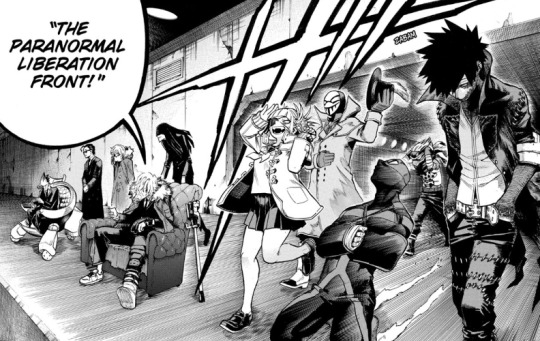
The end of the My Villain Academia arc ends with the swerve of both the meta liberation army, and the League of villains working together. This however, was most likely planned from the start as every single character that gets development this arc Himiko, Twice, Spinner and Dabi faced off against their foil in the Meta Liberation Army Curious, Skeptic, Trumpet and Apocrypha.
The fact that most of these characters survived their encounters means we will likely see continued interactions between the Villagin’s League members and their MLA counterparts for the sake of development. More of their foiling underneath the cut. If you want to read about Shigaraki and Redestro I already covered it [here].
Himiko vs Curious
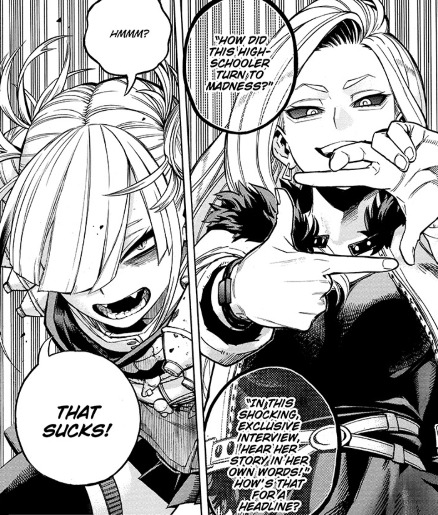
Curious and Himiko resemble each other heavily on the surface, and have a lot of elements in common with their characters. They’re both the femme fatalle archetype of their groups, and dress in an overtly feminine way. Magne and Apocrypha are also female members of both respective groups, but they are not femme fatalles in the way that Himiko and Curious are.
A femme fatale sometimes called maneater or vamp, is a stock character of a mysterious seductive woman whose charms ensnare her lovers and who deliberately leads them into dangerous or even deadly situations. She’s a commonly used in literature, able to entice, enchant, or even directly influence others sometimes to even supernatural extents. They’re tied mythologically to archetypes of enchantress women, or women who use some kind of magic or ability to seduce and deceive men.
One of the most common traits of the femme fatale includes promiscuity and the rejection of motherhood. Femme fatale, french literally translates to disaster woman it’s the appearance of a woman that leads ultimately to the destruction of the male.
Both characters are connected to the Femme Fatalle archetype, not just in the hyper sexualized way they present themselves. Himiko herself is a vampire (fitting for someone who can be called a vamp) she also is capable of taking the appearance of other people to enchant them and lure them into a sense of false safety when they are around her. She’s also a serial killer who falls in love with men, and becomes motivated to kill them, making her a literal bringer of disaster for the men she becomes interested in. When Himiko took the appearance of Cammie in order to get closer to Izuku, that scene has a lot in common with the typical femme fatalle ploys, women tries to use womanly charms to deceive the male main character.

While Curious lacks the kind of quirk that would increase her ability for deception like Toga has, she uses her position as a reporter and an executive in the meta liberation army to keep people under her sway. We see them literally at her beck and call throughout the entire fight, and because she’s able to control the crowds so effecitvely she almost kills Toga. Another important detail is intrepid reporter is a pretty common femme fatalle character archetype especially in noir stories, the woman who would do anything, even use her seductive wiles to get the story. Curious is also blue skinned, which is most likely a reference to mystique one of the more famous femme fatalle super heroes. (Considering that Toga’s power is just... literally mystique from X Men her coloring makes a lot of sense).
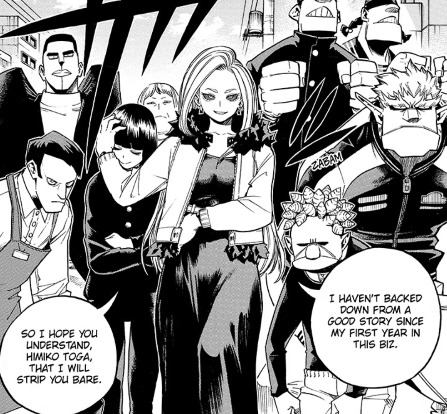
Curious also reflects Toga’s relationship of bringing disaster to other people as well, she turns her own loyal followers into bombs the same way that Himiko stabs the people that she loves.
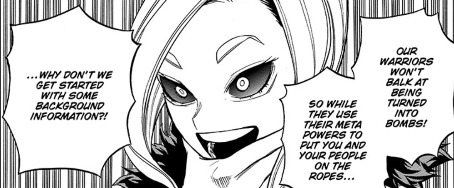
While they are on the surface the same character, this is where they actively begin to differ. Himiko’s motivations are internal, she’s driven by her own obsessions, whereas Curious has an external motivation her primary motivation is to capture a story about someone else’s life. They are both people that obsess over others and try to make them theirs by stealing some part of them, Toga that person’s appearance, Curious by changing that person’s narrative stealing their story away for her own gratuitous use.
However, their motviations are entirely different, Himiko knows what she wants inside of herself and is incredibly intune with her own desires mostly following those. Toga is so full she’s overflowing. Her greatest desire is to live as herself, and for Toga living as other people is just an expression of living as herself.
While Curious finds her own self lacking. If Toga is overflowing with self identity, Curious is lacking. Which is why she steals the story of others instead, trying to make up for what she sees as missing in herself. She’s jealous, because Toga knows what she wants out of life, and is living a life true to herself and seems to be enjoying it much more. Toga lives an eventful, attention grabbing life, and she tries to change Toga’s headline to strike back.
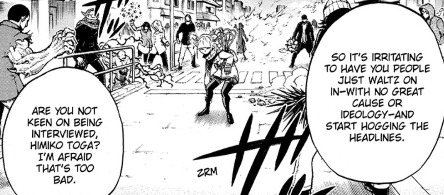
Curious dies too quickly to be a fully fleshed out character, but there’s a lot you can infer from her projection on Toga. The most important thing to remember for all four of the MLA members is that they are most likely people who have been raised from birth to devote themselves to the ideals of the MLA in a cult-like fashion. Rikiya tells Curious that her writing is lacking in something, that it won’t move people. Curious herself is someone who lacks heart, which makes her the polar opposite of Toga who always lives true to her heart in an almost love crazy fashion.

However, if you assume Curious does not really believe in the cause of the Meta Liberation Army but rather it was sometyhing that was forced down her throat, therefore she does not have any ideals of her own what she is yelling at Toga makes a lot of sense.

Curious had no chance of a normal life if she was born into the MLA. Which means to her, Toga is someone who was given a chance at a normal life and turned away and chose to become a villain instead. Which is probably why Curious is so desperate to make Toga a martyr for their cause, not only for projection and jealousy reasons, but also because if Toga really were someone who was driven crazy by her quirk and suppressed by society then Curious’ world view would make sense. What she had been taught since birth was right after all and the framework of the world was not wrong. She doubts it but ultimately, she chooses to try to reinforce her belief in the MLA propaganda in the end rather than challenge it. Toga loves her life, Curious does not.
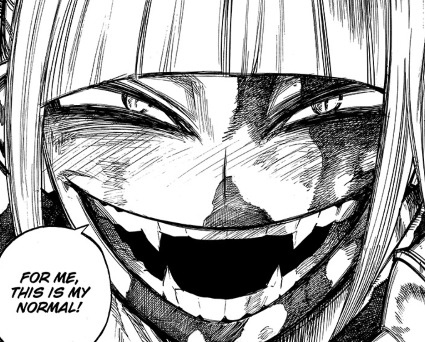
So you have someone robbed of a normal life trying to convince herself that she really believes in all this stuff, facing off against someone who had a normal life but instead just chose the life she wanted. Toga is comfortable with her life, she believes this is her normal life where she is accepted by the LOV, whereas Curious is not. This difference is also why Curious ultimately dies, because Toga loves her life enough that while she does chase after her obsessions she actually has highly trained survivalist instincts and will run away, or bail when things become too dangerous to protect her own life. Whereas, we see Curious get lifted into the air before she’s dropped but she makes no move to save herself and instead dies still thinking about the story she is going to write.
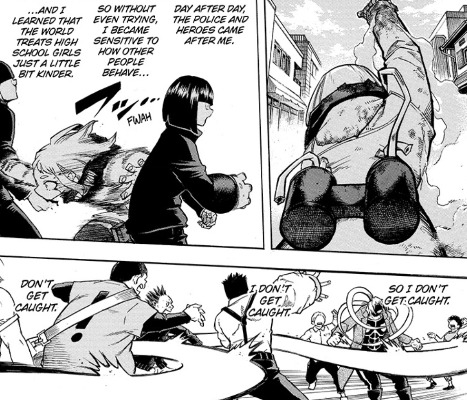
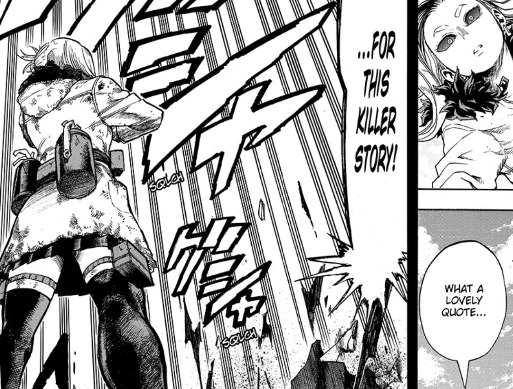
Twice vs Skeptic
There’s also a contrast in how the other characters react to their grievious injuries, Curious gets false sympathy from the MLA members, whereas Twice genuinely caring and wanting to protect Toga ends up fighting for her sake. We see Skeptic only react to Curious’ death by calling her a valuable asset, whereas Twice is genuinely distressed.
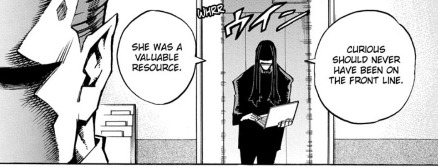

The reason that Twice and Skeptic come into conflict is also because of Curious death. Skeptic wishes to kill Toga to avenge her, while Twice wants to protect Toga.

Once again these are two characters that have a lot in common on the surface. They share designs where most of their face is obscured, Twice because of his mask, and Skeptic because of his bangs. They are characters who act as the comic relief for their groups, and have little to no social skills. Both of them have a tendency to get in the face of other characters rudely. Both of them have overexaggerated and dramatic mannerisms and body language.
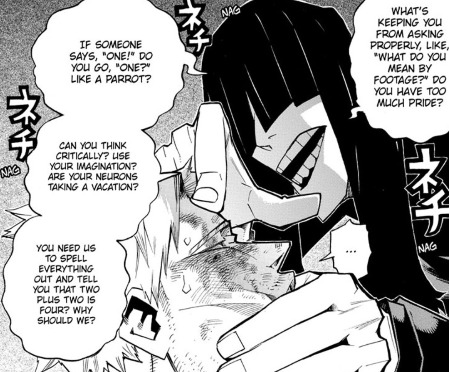
Their quirks are also similiar, Twice creates doubles of things and Skeptic changes things into human sized objects that they can control. They can both create minions with their abilities, but Twice’s have free will and can turn against him, whereas Skeptic’s are just puppets with no consciousness.
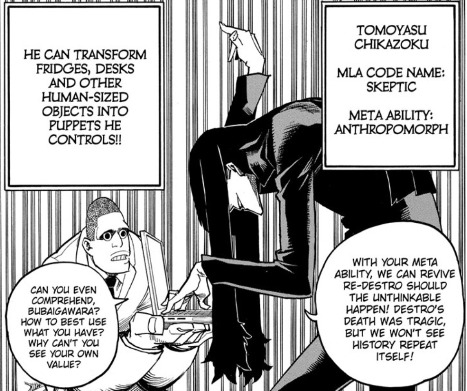
While both of them are an odd combination of social, and antisocial. Twice is the one who wants friends the most, but also tends to be rude and have no idea how to pick up on social cues, and also in life was a jobless burnout who had no friends or relatives to sympathize with his problems. Skeptic is the only member who specifically fights to avenge a fallen member of the MLA. Skeptic is also pretty devoted to Redestro the same way that Twice is to the league. However, he’s also tactless and inside his own head in the same way twice is.
They start the ar with complete opposite social status. Twice is a mess psychologically and otherwise, and was living basically as a homeless vagrant on the absolute bottom of society. Skeptic may also be a weirdo, but he’s a succesful tech ceo and on top of that a prodigy who is hailed as a genius despite his eccentricities.
Twice is also someone who has little to no control over his own life, whereas Skeptic being a highly rich and influential CEO who had control of all the cameras in the city and also the ability to manipulate those puppets is a control freak who focuses on making everything go exactly his way.
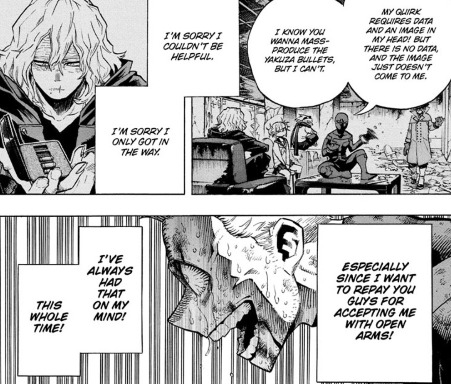
His want to repay the league is what strengthens Twice in the end. The genuine connections and his acknowledgement of his mistakes, made him stronger. Whereas Curious’ subservience to the MLA, and his own perfectionism end up causing him to come crashing down just while Twice is rising up.


Spinner vs Trumpet
An important detail between the MLA and the LOV is that the Liberation Army members are all subservient. They regard themselves as nothing more than tools serving the cause which is why they don’t mind all charging the guy disintegrating people with a touch at once, or being blown up to be used as a weapon against Toga. Whereas, while Shigaraki is still the leader the LOV members are allowed to question him, talk with him as an equal, and even poke fun at him. Shigaraki is seen as one of their own.
The arc starts with Spinner calling out Shigaraki in front of everyone, and also questioning him to no consequence at all. Shigaraki was not even going to get violent he was just asking Spinner to wait to let him explain himself.
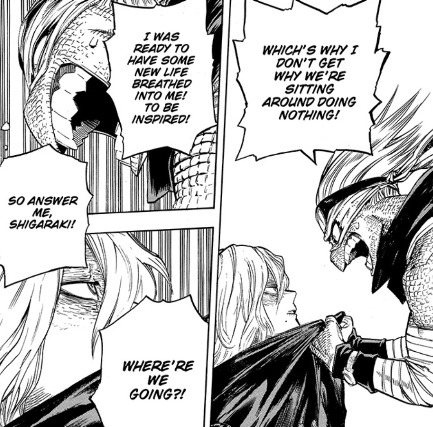
Spinner joined the league out of empty admiration of Stain and soon realized the reason he was staying with the league had nothing to do with Stain anymore. He didn’t believe in Stain so much as the feeling that Stain gave him, that he could change things. Spinner’s entire arc is him coming to terms with this, that he’s not really motivated to act on his own, he’s no one special on his own, he’s a follower that wants to cling to another person’s dream.
Spinner and Trumpet are different as can be on the outside. Trumpet is a charismatic and succesful politician in the upper crust of society, who also has a transmitter quirk that lets him provide power to his followers that trust in him. Spinner is not a leader in any sense of the wrod, and he’s alsoa discrimminated against member of society.
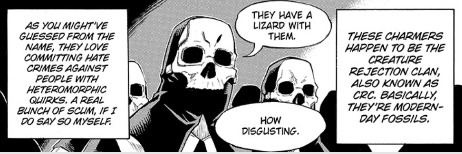

Trumpet is someone with a useful quirk, connections, a high social status and a social group he is a part of with people who are willing to trust him with their lives. Spinner was just a neet who got bullied too hard. He was one of the dregs of society. Not only that even though he has a lizard quirk that changes his whole body, his quirk does not even give him that many powers. He’s not even useful quirkwise as say Tsuyu. According to his profile he has the weakest quirk in his whole family of lizards and can only stick to a wall.

Trumpet and Spinner are the same however, because they both try to change the world based on ideals that are not their own. They’re followers who cling to other people’s ideals, and try to make other people’s visions real. Spinner admits this, while Trumpet is in denial. Trumpet is also a hypocrite, he claims that he believes in quirk liberation and treating all quirks equally then goes out of his way to degrrade Spinner based on his quirk. Spinner is also a hypocrite in that he doesn’t actually care that much about Stain’s ideals, and only gives the most token adherence to them but again he is someone who knows that he’s just a cosplayer.

Trumpet is a mebmer of a cult trying to make Destro and Re-destro’s dreams come true, and despite being a politician and a leader he’s fiendishly devoted to someone else. That, and his quirk that relies on inciting others rather than fighting himself makes him a natural support member to.
Spinner’s goal becomes to support Shigaraki, which is different than his empty worship of Stain, because Spinner got to know Shigaraki as a person and decided to support him after that fact. While he may just be clinging to Shigaraki, one he knowingly does it, and two this time around he chose to support Shigaraki as a friend instead of just an empty cosplayer. They are both support characters who are weak on their own but fight on the front line anyway. Spinner makes up for his lack of a quirk with violence and sheer effort. Whereas, Trumpet actually does not need to put himself in harm’s way as his quirk would work perfectly find without him standing in front of everybody. Trumpet is naturally suited to lead but doesn’t, Spinner isn’t even suited to fight on the front lines which is why we see him try so hard to change and put the effort in.
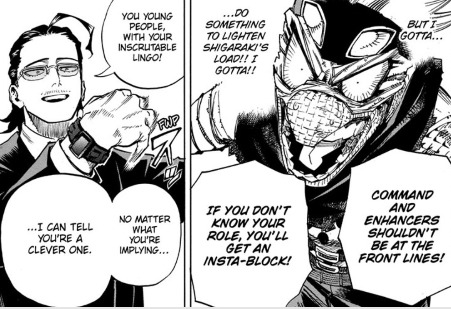
Spinner grows, he gets to know the person he is supporting, and decides to support them because he wants to help them with their trauma and lighten their personal load. Trumpet continues to follow ideals that aren’t his, and refuses to admit his personal connection with Re-Destro and therefore he fails to grow and ends up losing. Spinner witnesses Shigaraki’s triumph, while Trumpet observes Re-Destro’s fall, because unlike Spinner he was never able to be there for Re-Destro as a person. He only ever saw him as the symbol of Destro, and left Re-destro alone in his burdens until Shigaraki came to liberate him.
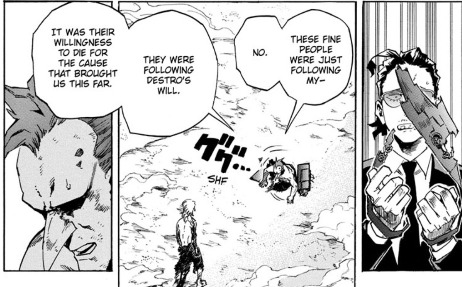
Dabi vs Apocrypha
This one is most likely going to be the shortest because not a lot about Dabi or Apocrypha’s characters were revealed during their initial fight. The two of them however have a lot of similiarites from the start, they both again have obscured faces. Apocrypha’s face is entirely covered by their hood the entire time, if Dabi is Touya then his dyed hair and stapled together face and burn marks serve as his disguise. They both only go by one name, Apocrypha is given no real name even though the rest of the MLA members have them, and Dabi is the only LOV member who we only know their alias and not their real name.

They both follow extremists seeking to revolutionize. Dabi follows Stain’s ideals, whereas Apocrypha follows Re-Destro. There’s a lot of similiar and opposites at play between them, the most obvious being fire and ice.
Also in their real apppearances, once again if Dabi is Touya that means he looks far more like his father Endeavor and even inherited his father’s quirk, but his actual ideals of becoming a villain and trying to reform the hero system are in rebellion to his father.
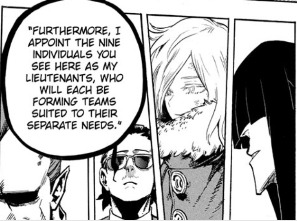
Apocrypha has an ice quirk and resembles Rei, however her ideals are not in rebellion but rather she accepts and spits out everything the MLA told her and buys into their propaganda completely. While looking like, and having an ice quirk like Rei, she lives ironically by Endeavor’s values that having a strong quirk is more important than anything else.
Apocrypha was even raised in the same way presumably Touya, and Todoroki were raised. That is she was trained from a young age, not allowed to go to school or socialize and worked only on developing her quirk. She was raised by Re-Destro specifically for the purpose of becoming a strong quirk user the same reason Endeavor bred children, however unlike Dabi who hates his father for this Apocrypha believes this makes her special and chosen.
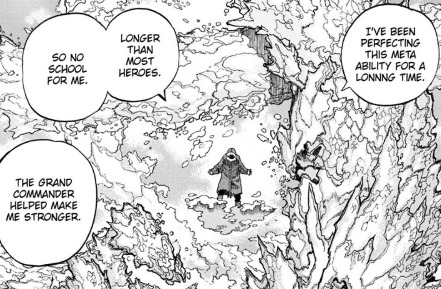
Once again these are opposite reactions to the same abuse. Touya choosing to disregard what his father tried to force him to learn, and Apocrypha trying to accept it and live up to her role as the tool, and weapon she was raised to be. They are opposite reactions, but both of them are still victims of abuse.
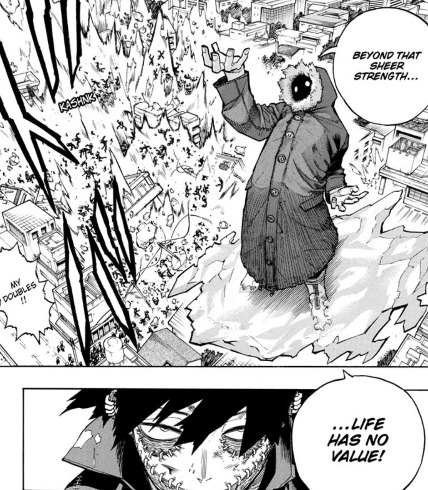
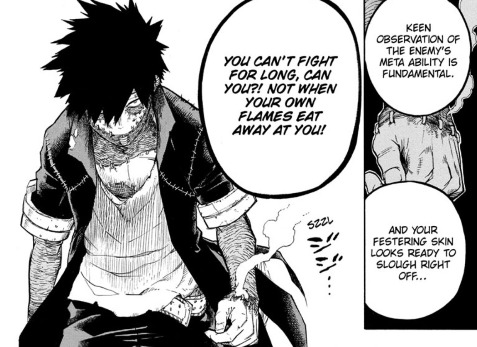
Apocrypha also carries out the role that she was perfectly born to be, not only has her quirk experienced a serious upgrade in the same form of Shigaraki’s, but she also can control it perfectly. While Touya’s quirk is in exact opposition to his body, and trying to use it burns his body even worse. Touya the rebellious child could not be a tool even if he wanted to be, he’s thrown out as a failure, burned by his own quirk. Apocrypha fits into the mould that she was raised as perfectly, the willing tool, but because of that she doesn’t question the way she was raised, see how she’s been used, and overall failed to develop as a person. There’s a reason her face does not show underneath her parka, it’s because she’s entirely lacking in a sense of identity or beliefs of her own besides what the MLA told her to believe in.
Apocrypha and Dabi are also both close to their respective leaders. Apocrypha has fondness for Re-Destro and was trained personally by him, however in the end she’s just a devotee, a sycophant. While Shigaraki and Dabi do not get along on the surface, Dabi is also given much more freedom and trust in the league because he’s allowed to go off on his own on several occasions he is basically Shigaraki’s number two.
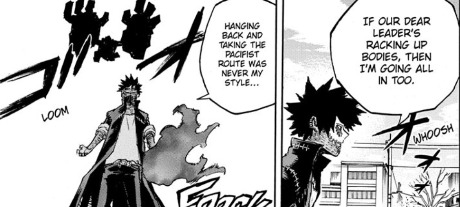
As opposites as their beliefs are, their methods are shockingly similiar. Remember, I know the MLA’s beliefs are bad and they are all hypocrites ultimately, not to mention they have parallels to their real world ableism in comparison to their views on quirks. I am not saying that Dabi and Apocrypha have similiar ideals, they’re the opposite, and Apocrypha’s are definitely more twisted. However, the two of them have similiar methods. They both believe in killing those who do not fit their standards.
Dabi follows Stain, who killed heroes who were not good enough heroes, and even heroes who were not true to the spirit of being heroes just as an example. While there are definitely corrupt heroes, people who were innocent were caught up in it as well as casualties. Iida’s older brother may have only been a career hero who treated it like a dayjob, but not only is Iida’s big bro a genuinely good person he also uses his corporation in Vigilantes as a way to employ as many people as possible in hero work so therefore even people without immediately useful quirks can contribute on their own. Quirk elitism, and individualism are definitely what created Endeavor’s circumstances, because he had a powerful quirk he’s accepted as a hero despite what he did to his family and having no ideals of a hero.
However, at the same time Stain took out somebody who was basically Endeavor’s exact opposite. Older brother Tensei literally was against individualism, and promoted cooperation and helping people without traditionally strong quirks and letting them have a chance to help the hero industry because teamwork and greater efficiency would result in more people saved. However, by culling, and focusing on trying to create really strong individual heroes to hold the system on their backs Stain is in fact achieving the opposite of what he wants with his methods. He’s endorsing individualism, and right of the strong, the things which allowed Endeavor to become so corrupt in the first place.
Basically by achieving everything alone with strength, Stain becomes a reflection of the corrupt, strength obsessed, hero system that he despises so much. Apocrypha said those who do not have strong quirks are better off dead. Dabi regularly kills people who do not meet his standards for following Stain’s ideals.

If they do not meet a certain quality, Dabi will treat them as fair game to kill. (Though to clarify Dabi’s want to rebel against Endeavor or even kill him is not something I see as wrong, it’s more like how he burns random thugs on the street, some of which probably had families or loved ones too. Considering Dabi’s entire motivation is that he comes from a broken house it’s in direct opposition to his ideals). While the ideals are different, Dabi is employing the same methodology as Apocrypha here. He suffers from the same dangerous extremism that even pushes him to act contradictory to his ideals, and makes him do things he regrets.
It’s not just something that will eventually counteract his ideals, (because once again Dabi does not believe what Endeavor tried to force on him, but he does use brute strength to try to accomplish his ideals because it’s the only viable option for someone like him, or all he knows) but it’s also incredibly unhealthy for both of them in the end. Apocrypha is barely a person, and Dabi is burning himself from the inside out every time he pushes himself to extremes to make his ideals a reality.
It’s not only destructive to other people, it’s destructive to themselves. Which is why it’s a trait both of them should grow out of if they are going to have continuing arcs in the story.
#mha meta#lov meta#league of villains meta#dabi meta#spinner meta#himiko meta#dabi#himiko toga#spinner#twice#league of villains#my hero academia meta#meta
219 notes
·
View notes
Photo


From show creator Carina MacKenzie, The CW series Roswell, New Mexico is back for Season 2, and Liz (Jeanine Mason) is torn between having her sister Rosa (Amber Midthunder) back and the sacrifice that Max (Nathan Parsons) made, in order for that to happen. And while Michael (Michael Vlamis) and Isobel (Lily Cowles) are struggling with their own grief over the death of Max, Rosa begins experiencing mysterious side effects from her resurrection, as she realizes that she’s been kept in the dark about what really happened the night that she died.
During this 1-on-1 phone interview with Collider, showrunner/writer/executive producer Carina MacKenzie talked about how the death of her male lead was in her original pitch for the series, the interesting ways that they’ve made use of Nathan Parsons throughout the season, that the secrets pretty much all of the characters are keeping are going to blow up in their faces rather quickly, getting to explore the sister dynamic, that there will definitely be more Maria (Heather Hemmens) this season, her approach to exploring Michael’s bisexuality, how original Roswell star Jason Behr ended up doing a chunk of episodes, and what she’s most excited about with Season 2.
Collider: First of all, congratulations on already having a Season 3 renewal before the premiere of Season 2. That’s awesome.
CARINA MacKENZIE: Thank you! I think it’s awesome, except I’m so tired and I have to go back to work on Monday.
When you tell the powers that be, “Hey, I’m going to kill off my male lead and start Season 2 with him dead,” what was their reaction? Did they try to convince you to do something else?
MacKENZIE: This was actually part of my pitch, when I pitched Season 1, from the very beginning. I can’t remember if I told Nathan about it during the pilot episode or during when we were shooting the second episode, but it was the plan from the beginning, so they knew where we were going. I think they trust me on that stuff. I always make the joke that I’ve killed Nathan Parsons a lot on television and he always comes back, in one way or another. We started the series with Liz taking a bullet to the heart and with him saving her life. This is a show about a woman. It’s not a show about a man being the hero, all of the time. So, if that’s how we started our series, we wanted to turn the tables and say, “Okay, she doesn’t have superpowers the way that he has superpowers.” Our show is science fiction. It’s not about magic and witches and rituals. It’s about science. So if he somehow, within him, has the science to save her life, then somehow, she should be able to use that science to save his. The studio and network definitely were a little bit worried about how much we used Nathan Parsons because we pay him for every episode, no matter what, and you like to get your money’s worth. And so they were like, “Are we renegotiating his deal here?” But we did find interesting ways to use him throughout the season, whether it’s nightmares or flashbacks. I also made Nathan come in to do work that wasn’t even Max related. We had a character that we hadn’t cast yet, but we needed to see their hands, and I was like, “Okay, you come to work and be the hands.” Whenever we had a shadowy figure whose face you can’t see, I’d be like, “Hey, Nathan, come to work.” It was actually fun for him, I think, to get to be around when he wasn’t around, ‘cause he actually lives in Santa Fe, as opposed to some of the other cast members who live in L.A.
It seems as though everyone is really starting off the season with secrets and things that they’re hiding from each other. How will that affect things? How soon will those secrets really start blowing up in everybody’s faces?
MacKENZIE: Quickly, in different ways. Alex and Maria have a conversation that they need to have about the status of their relationships with Michael. Maria has been in the dark about a lot of things, including the fact that no one’s told her that Rosa is back, and she was incredibly close to Rosa. No one told her about Noah, and she was one of Noah’s victims. Secrets don’t stay buried very long on the show, so there will definitely be some fall out. But I also think that, in some cases, the fallout is gonna be what makes what makes the relationships stronger, as opposed to what weakens relationships.
With Rosa back, you really get to explore the sister dynamic now, in present day. What have you enjoyed about that relationship, and watching what Jeanine Mason and Amber Midthunder bring to that?
MacKENZIE: Well, they are amazing. Obviously, they look alike, which helps, but they also did a lot of work together to work on mannerisms that they could create for these girls to share. Right off the bat, in the pilot, they’re sharing a motel bed on their road trip, and they both sleep with one leg outside of the covers. Little things like that were things that the actors got together with us and we said, “Okay, how do we create this feeling of Rosa being a relatively new force in our present-day Roswell, but still show the audience how deep the history runs?” Working with Jeanine and Amber made that very easy.
You’ve previously talked about there being more Maria, in general, this season. What can you say about her storyline and what Heather Hemmens is bringing to it this season?
MacKENZIE: Heather is a goddess. She is the queen of my life. There is literally nothing that I’ve asked her to do that she hasn’t done, with full enthusiasm. I will say that we put Maria into situations that I don’t think the fans are going to see coming. I got a phone call from Heather once and she said, “I’m hearing a rumor that this might be happening in the next episode. Please tell me that’s not true.” And I was like, “Read the script and tell me what you think. We’ll change it if you hate it, but just read the script.” And then, when she read the script, she was like, “Oh, hell yes!” I know that I’m being incredibly cryptic, but we’re pushing boundaries with her character and we’re exploring all sides of her. We’re learning who she is, not just as Liz’s best friend, which was what it felt like throughout Season 1, but we’re learning who she is as a business owner, as a caretaker for her mother, as a friend, and as a girlfriend. We get to see a lot of sides of her, but one of the things that I’m excited about is that we put Maria and Isobel together a little bit more this season. They’ve got this really fun, long, deep history of just hating each other, for no real good reason, whereas the actresses, Lily [Cowles] and Heather, live together and love each other. So, it led to some really fun dynamics on screen.
One of the things that I love about Michael being a bisexual character is that it’s allowed you to explore two relationships with him, the one between Michael and Alex, and the one between Michael and Maria. What’s it like for you to get do that, be able to bring that to life, and to hear how people feel about being represented in that way?
MacKENZIE: The representation part of it is really important to me. It’s really important to me that it’s not portrayed like he’s having two relationships. He is a very honest character. When Michael keeps secrets, it is not because he wants to keep secrets. Michael’s not gonna be a person who’s cheating on anybody, ever. He’s not someone who leads people on, or wants to hurt anyone. And those relationships are very different. Michael and Alex’s relationship, the bulk of it, was the summer after their senior year of high school, and that was 10 years ago. There are obviously a lot of lingering feelings, and there have been some brief reconnections over the years, but he isn’t in a committed relationship with Alex. He’s also not yet in a committed relationship with Maria. But when Michael does commit to someone, it’s very important to him to be true to them and to be honest. That’s been my whole thing. We’re not playing this bisexual character as a promiscuous person who can’t decide what he wants, or who wants both, and who’s just flitting between the genders. He’s very much a lover. And it’s been cool for me to play him as the Joey Potter or the Felicity. He’s not the typical person in the center of a love triangle. The other thing that’s important, too, is that Alex and Maria aren’t rivals. They are people who have a very deep history with each other and who love each other very much. Later on, we tell a story where Maria admits that, when she was a little kid and Alex was her best friend, she always thought she was gonna grow up and marry Alex. So, there are a lot of layers to this, and we’ve made sure to tell it with respectfully because of the representation angle, but also, we’re not trying to tell a story about people that aren’t flawed and that don’t make mistakes and that don’t have any nuance to them. We’re telling a story about people who mess up sometimes and who have to emerge from that, just like anybody else.
It’s also very cool that you have Jason Behr coming onto the show for Season 2.
MacKENZIE: Yes, it is.
How did that come about? Did he agree to it, and then you wrote the character tailored to him, or did you write the character, and then try to convince him to do it?
MacKENZIE: I met Jason at Julie Plec’s birthday party, and literally sat talking to him for five hours, and I’m not exaggerating. Everyone, including the person who was throwing the party, had gone to bed, and Jason and I were still talking about work and art, and what inspires us as artists. He had watched the first season of the show and he said, “If you want me to come do a cameo, reach out.” I didn’t think he was serious, but I thought it was worth a try. And we had this character come up that was a pretty small character because I didn’t think Jason was gonna be interested in going back to work full time. He hasn’t, in a really long time. He’s a dad, and he’s very much rooted in L.A. But when I reached out to him about the character, he was so excited that he was like, “Well, I’ll stick around.” We developed a very rich backstory for this character. He has a very deep and complicated history, and a very interesting future. He ultimately appeared in five episodes out of 13, which is a lot, and he’s essential to the season. I also cannot say enough wonderful things about working with this man. I was expecting somebody to come in with some reluctance to revisit a reboot of something that he had worked really hard on 20 years ago, but there was no reluctance. He was immediately one of the gang. He gave everybody advice. He knows the show, inside and out. And we put him through the ringer. He did not have an easy time on the show, at all, and he never didn’t have a smile on his face doing it. If anybody, in the future, gets the chance to work with Jason Behr, jump at it ‘cause it was a dream. It was a literal dream. I had the guy’s poster in my locker when I was a kid.
What are you most excited about with what you’re getting to do in Season 2, and how you’re also working toward Season 3?
MacKENZIE: Season 1 was my first time as a showrunner, so I was nervous and I had a lot on my plate. With Season 2, I felt a lot steadier on my feet. With Season 2, I pushed the stories to be bolder and pushed us in directions that scared the crap out of me because I had more confidence that I, as a writer, would be able to rise to the challenge. I told some stories that shook some things up on the network, and that we had to really, really defend. They ultimately ended up being very supportive of us, but we definitely threw some surprises at our bosses, which we didn’t really do in the first season. So, bolder is the word. We are entering territory that’s a little more controversial, a little darker, and a little sexier, in some cases. I’m just seeing what I can get on The CW.
[x]
6 notes
·
View notes